#we can HAVE a star wars story without the force. and it can even be good! in fact it will probably be better!!!
Text
well folks, i guess we should’ve thought to add “omega force sensitive” to our bingo cards
#i will genuinely be so upset if that’s the route they take#but the seeds are planted and i don’t trust that disney is going to subvert our expectations here#looking pointedly at sabine.#we can HAVE a star wars story without the force. and it can even be good! in fact it will probably be better!!!#tbb spoilers#jackwords
5 notes
·
View notes
Text
You know what? I actually genuinely like the witches on Brendok, I wish we had gotten to see more of them, because they got to exist as a cool addition to the galaxy, got to be dangerous and dark, but also had moments of care and willingness to let go.
Aniseya genuinely loved her daughters, she was willing to let Osha go because that's what Osha honestly wanted. But she was also someone who did harm to others, she invaded Torbin's mind in a way that seemed to really tear him up.
The rest of the coven probably genuinely saw themselves as not bad people, despite that nearly all of them were willing to perform a ritual that could kill themselves just to invade someone's mind to force him to kill his friends, because they felt threatened.
It's not unreasonable why they felt that way! If you look at things only from their perspective, if they felt like they were under attack, it doesn't matter what the Jedi actually said or did, it's very easy to step down a bad path. It's easy to misinterpret and to feel like you can't trust outsiders to understand you.
I even have affection for Koril, who could clearly see that Sol didn't want to attack her, that he was working so hard not to fight her, she wanted him to fight her, screamed at him to do it, so she could kill him, and you could see it in her actions that it was because she felt desperate that she was going to lose her children. It didn't matter that Osha wanted to go, that she'd been dreaming of it even before the Jedi ever came there, because Koril didn't want to let go of either of them. It didn't matter that she was strict and borderline mean to the girls, you could see it was out of fear and desperate worry that they would be found. It doesn't matter that she wanted to hide them away from the world, that it wasn't good for the girls to be hidden that way, it was genuinely because she cared about them, even if it was falling into attachment as Star Wars defines it (the more Buddhist-aligned version)--the desperate fear of how you will feel without someone, rather than what they actually need.
I love that they're a bunch of hot messes in ways that aren't healthy but are easy for me to identify with and easy for me to understand where they were coming from.
They're just a really interesting source of conflict in the story that you can point to how they walked their own path to this end, but also that they did so out of sympathetic reasons.
471 notes
·
View notes
Text
Debunking more myths in the GFFA: the Jedi and the clones.
I wrote a post debunking the various myths about how "the Jedi condone slavery", a while ago. Something I had omitted (because it's such a big topic) was the following two statements that concern the clone troopers' relations with the Jedi:
"The clones were genetically bred to have accelerated growth, so they're technically child soldiers."
"The clones were slaves of the Jedi."
Both the above statements are inaccurate, let's explore why.

"The clones were child soldiers"
Let's get the easy one out of the way first, because it's a logic that cuts both ways. If age is our only determination of the maturity of a Star Wars character, then Grogu is not a baby. He is aged 50, and is thus a middle-aged man.
Who cruelly eats the babies of a woman...

... and knowingly tortures animals for his own sadistic pleasure.

Of course, I'm kidding. Grogu's none of the above things.
The narrative frames him as a cute baby who does innocent baby stuff. Him eating the eggs is played off as comedic, as is him lifting with the frog. To this day, some fans still call him "Baby Yoda".
Conversely, despite the clones being 10/14-years-old, their actions, behaviors, way of thinking, sense of humor, morals etc, are all those of an adult.
Like, Ahsoka is technically older than Rex in this scene.

The scene doesn't portray them as peers, though. This isn't written as "a teen and a tween talking". No, Rex looks, acts and behaves like a grown-up and is thus framed as such by the narrative.
You can make the argument "they're child soldiers", but (unless you're doing so in bad faith) you'd also have to argue that "Grogu's an adult".

"The clones were the Jedi's slaves"
Nope. For all intents and purposes, they're in the same boat as the Jedi, who George Lucas stated multiple times had been drafted to fight in the war.
Again: both the Jedi (monk/diplomats untrained for fighting on a battlefield) and clones (literally bred en masse only to fight) are being forced to fight by Palpatine and the Senate.

Though, on paper, the clones were commissioned by Jedi Master Sifo-Dyas, it was actually done by the Sith (who either manipulated or assassinated Sifo-Dyas then stole his identity, depending on the continuity you choose to adhere to). The rest of the Jedi had no idea these clones were being created.
So while the clones are slaves... they're not owned by the Jedi.
They're the army of the Republic, they belong to the Senate. This isn't exactly a scoop, they refer to the clones as something to purchase...
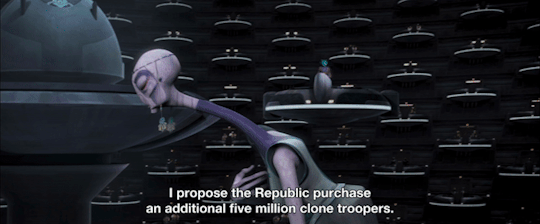
... and manufacture.

As far as the Senate’s concerned, clones are property, like droids.
Like there's a whole subplot in The Bad Batch about this very point: after the war, the clones are decommissioned and left out to dry because they literally have no rights, they served their purpose.
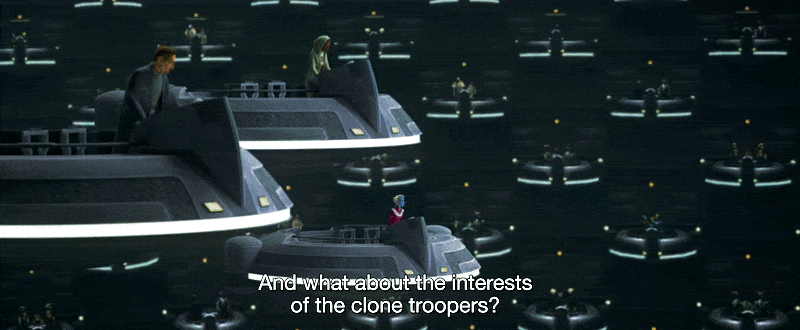
The only trooper to ever canonically blame the Jedi for the clones' enslavement is Slick, who the narrative frames as having been bribed and manipulated by Asajj Ventress into betraying his comrades.
Also, the only canonical Jedi shown to ever be mean, dismissive or mistreating the clones in any way, is Pong Krell.

And it's eventually revealed he’s in fact a full-on traitor, hence why the story frames him as an antagonistic dick from the moment he's introduced. He doesn’t represent the Jedi in any way.
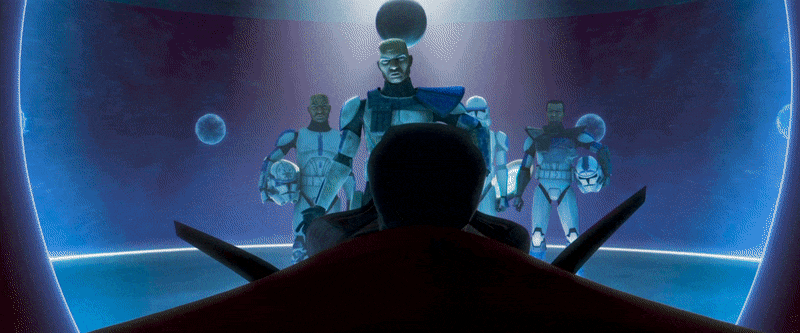
We know this because the other Jedi we’ve been shown are always prioritizing their clones’ lives over theirs, if given the chance.

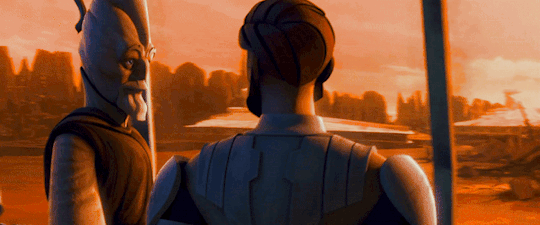
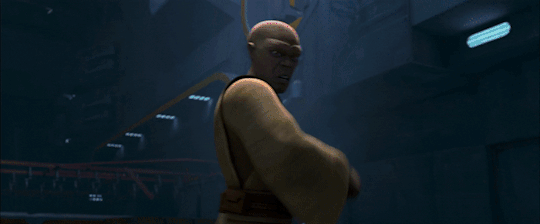
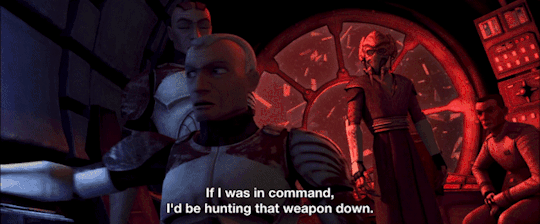
Finally, if we wanna get even more specific... as Commander-in-Chief of the Grand Army of the Republic (GAR), the clones belong to Palpatine.
Palpatine who is a Sith Lord.
Palpatine who arranged for the creation of the clones and had them all injected with a chip that would activate upon hearing a code-word...
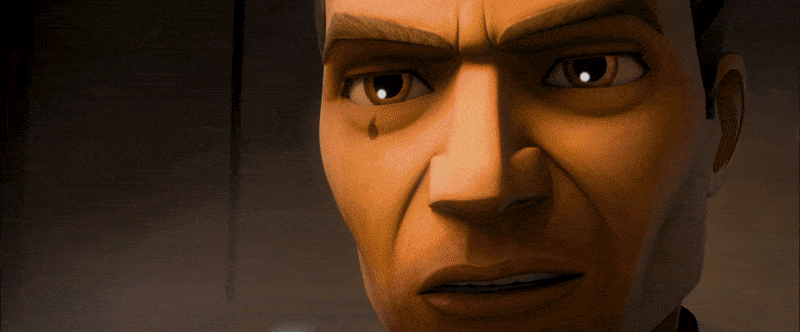
... and forced them to murder their Jedi without hesitation or remorse.
When you bear all that ⬆️ in mind and when you read this quote by George Lucas...
"The Jedi won't lead droids. Their whole basis is connecting with the life force. They'd just say, 'That's not the way we operate. We don't function with non-life-forms.” So if there is to be a Republic army, it would have to be an army of humans."
- The Star Wars Archives: 1999-2005, 2020
... narratively-speaking, everything falls into place.
Sidious knows that:
If he orchestrates a war designed to thin the Jedi's numbers, corrupt their values and plunge the galaxy into chaos...
If he wants to draft the Jedi - peace-keeping diplomats who’d never willingly join the fray - to fight in his war...
... then the only way they won't resist the draft and abstain from fighting is if they think joining the conflict will save lives.
So he creates a set of cruel, sadistic villains for them to face, opponents who will target innocent civilians at every turn...
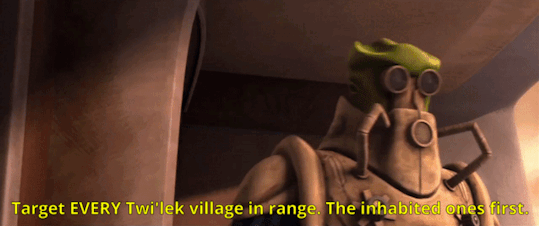
... and instead of lifeless droids, he prepares for the Jedi an army of men... living, mortal people who, despite being well-trained, will be completely out of their league when facing the likes of Dooku...

... Ventress...
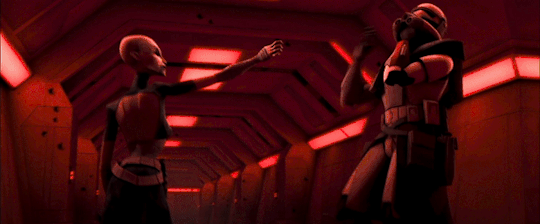
... Grievous...
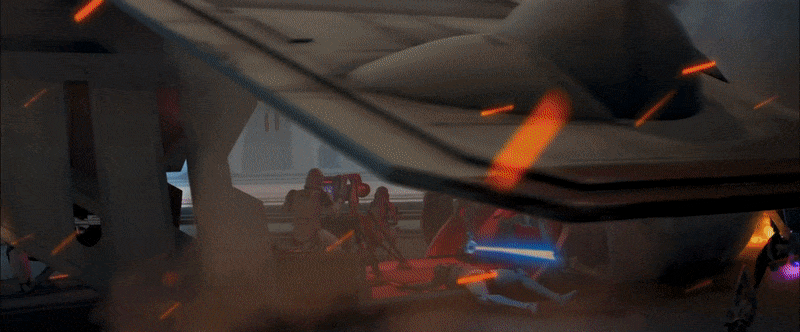
... Savage Opress...
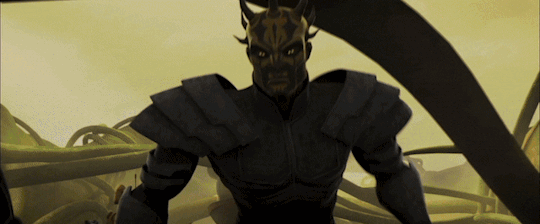
... or the defoliator, a tank that annihilates organic matter.
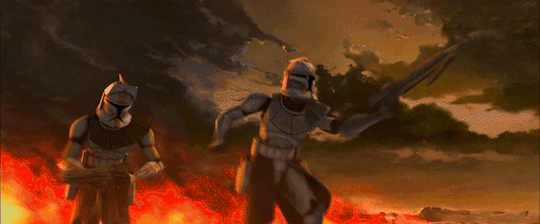
Thus, in order to save as many clone and civilian lives, the Jedi join the fray despite knowing that doing so will corrupt their values.
And as the war rages on, a bond of respect is formed between the two groups.
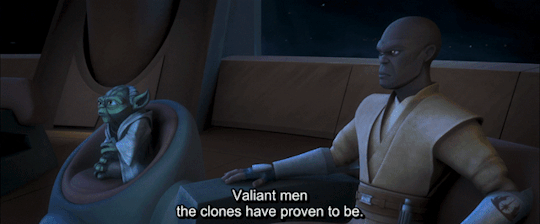
Clearly, the Jedi don't like the fact that the Republic is using the clones to fight a war, but for that matter, they don't like being in a war, in fact they advocated against it.

However, it's happening regardless of their issues with the idea or personal philosophies. Said The Clone Wars writer Henry Gilroy:
"I’d rather not get into the Jedi’s philosophical issues about an army of living beings created to fight, but the Jedi are in a tough spot themselves, being peacekeepers turned warriors trying to save the Republic."
And bear in mind, the Jedi are basically space psychics, the clones are living beings that they can individually feel in the Force...
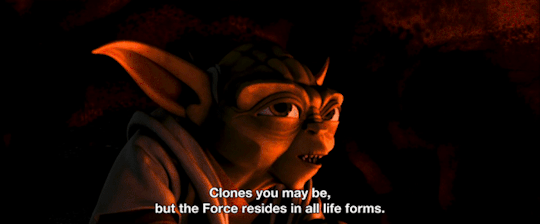
... so the Jedi feel every death but need to move on, regardless, only being able to mourn the troopers at the end of every battle.
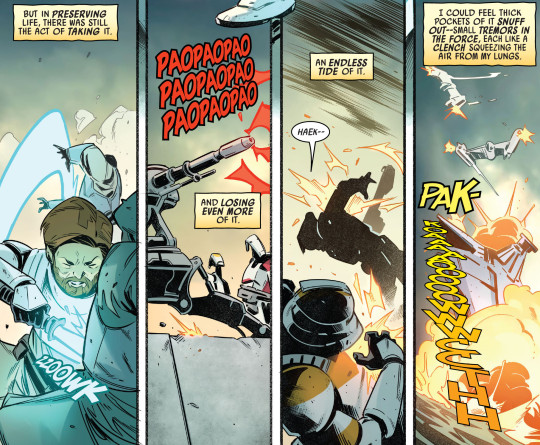
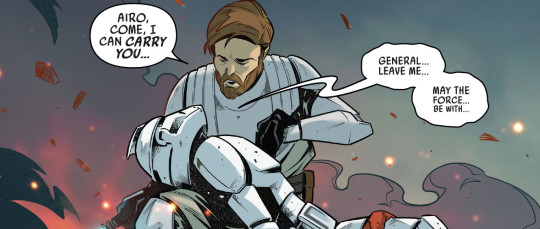
We see this in the Legends continuity too, by the way.
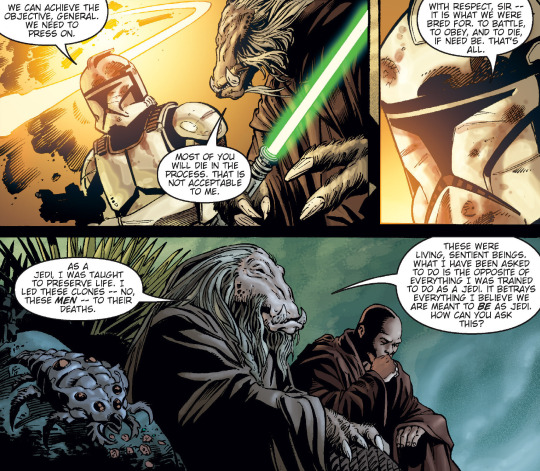
(that is, when the writers actually try to engage with the narrative)
Also, if you ask the clones, they’re grateful the Jedi have their backs.
When Depa Billaba voices her concerns about how the war is impacting the Jedi's principles, troopers Grey and Styles are quick to make it clear how grateful they all are for the Jedi's involvement:
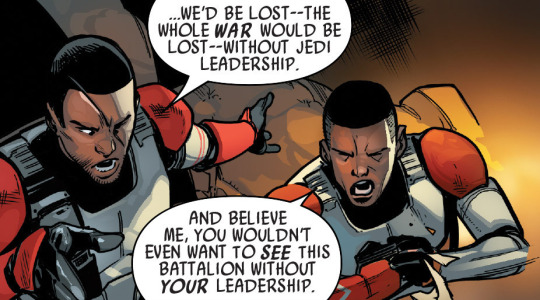
So the clones aren't the Jedi's slaves. If anything, they're both slaves of the Republic (considering how low the Jedi's status actually is in the hierarchy).
Only I'd argue the clones have it much, much worse.
The Senate sees the Jedi as "ugh, the holier-than-thou space-monk lapdogs who work for us"... but a Jedi has the option to give up that responsibility. They can leave the Order, no fuss or stigma.
A clone trooper cannot leave the GAR! If they do, they’re marked for treason and execution. Again, they’re not perceived as “people”.
And it doesn’t help that the Kaminoans, the clones’ very creators, see the troopers as products/units/merchandise. A notion that the Jedi are quick to correct whenever they get the chance.


How The Clone Wars writers describe the clones' relationship with the Jedi.
George Lucas hasn’t spoken much about this subject aside from the quote from further up. But to be fair... the Prequels aren’t about the clones’ dynamic with the Jedi, so it makes sense that he wouldn’t talk on that subject so much.
He did mention that part of The Clone Wars’ perks is that he could:
“Do stories about some of the individual clones and get to know them.”
But that’s as far as it gets.
So for this part, I'm just gonna let Dave Filoni, showrunner of The Clone Wars and the upcoming series Ahsoka, and TCW writer Henry Gilroy - both of whom worked closely with Lucas - take the wheel. They make themselves pretty clear on how the clone/Jedi dynamic is meant to be viewed.
Here’s Henry Gilroy:
"In my mind, the Jedi see the clones as individuals, living beings that have the same right to life as any other being, but understand that they have a job to do."

"The clones see the Jedi as their commanding officers on one hand, but also, at least subconsciously, they look to them for clues to social/moral behavior."
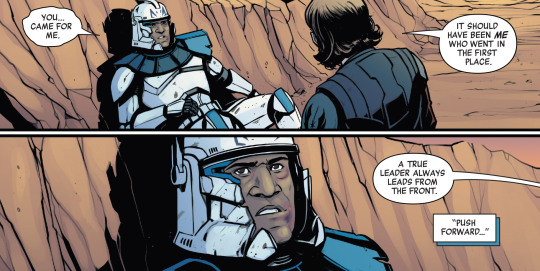
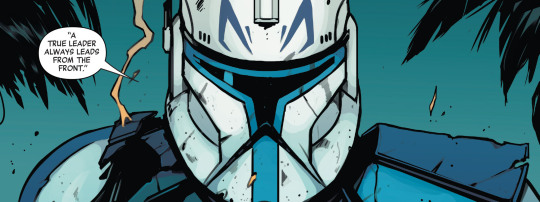
"Some clones may find themselves getting philosophical leadership from the Jedi that helps them answer some of the deeper questions of life."
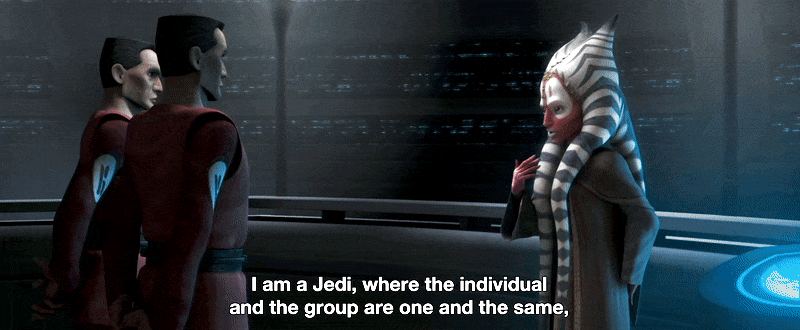
"We thought this was a great opportunity to show how the Jedi interact with clones. Specifically, Yoda in a teaching role of the clones, who were socially new, who kind of grew up— who were created to fight, and he really broadened their horizons and helped them realize there was a great big universe out there that was bigger than just fighting and killing."

And here’s Dave Filoni’s comments:
"I truly believe that the Jedi try to humanize their clones and make them more individual, as Henry says."
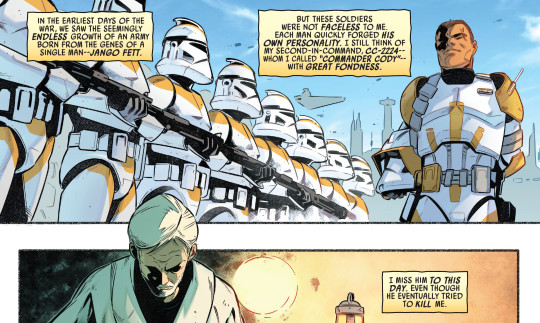
"I think we saw that in Revenge of the Sith, when the Clones were colorful and named under the Jedi Generals, and then in the final shots of the film with Palpatine and Vader near the new Death Star, the ships are grey, the color and life is sucked out. The Stormtroopers are only numbers and identified by black and white armor or uniforms in A New Hope."
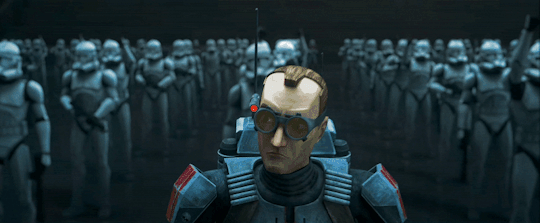
"The soldiers have become disposable to the Emperor."
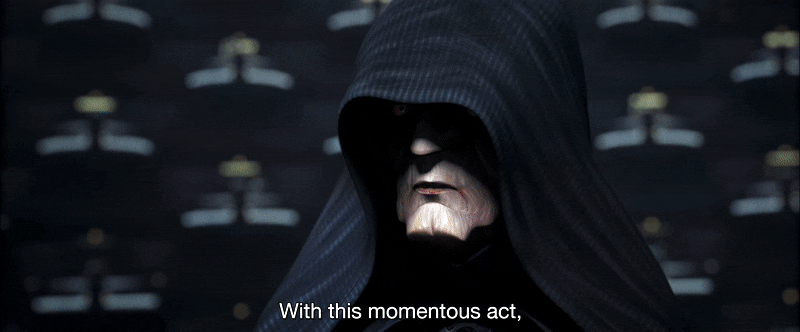
"That is something the Jedi would never do."
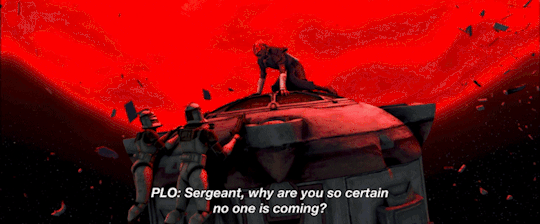
"Yoda teaching the clones much like he taught Luke. ‘Cause that was kind of natural for [the Jedi], a natural instinct to take to these clones like they’re students."
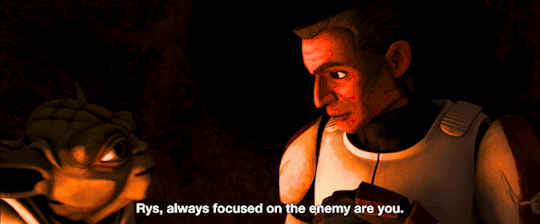
None of the above quotes from two different writers of The Clone Wars, who had many interactions with George Lucas, frame the Jedi and the clones’ relationship in a negative way.
How much more proof do we need that "the clones were slaves of the Jedi” isn’t the intended narrative?

My point being that while the clones' ordeal is indeed horrible, the Jedi have nothing to do with it. The narrative of The Clone Wars always frames it as the fault of the Sith, the Senate and the Kaminoans.
If you go by the intended narrative, the Jedi were the clones' teachers and brothers-in-arms. The clones and the Jedi were not just comrades.

They were friends.
#long post#But most of this is GIFs used for evidence#meta#SW meta#jedi#Jedi Order#in defense of the jedi#Clones#The Clone Wars#on the jedi's involvement in the clone wars#TCW#Clone Troopers#Rex#Cody#Plo Koon#Mace Windu#Obi-Wan#Yoda#Dave Filoni#Henry Gilroy#Grogu#George Lucas#flashing gif
2K notes
·
View notes
Note
I am a bit surprised at your tags saying you like jar jar, I don't really know anybody who's a fan in 2023. What's the appeal there, would you say?
Did people like JarJar more in the past? I remember when the prequels were new, his poor actor almost died from the harassment. Surely the venom against JarJar has only weakened.
But mmmmm...I guess what I enjoy about JarJar is he just. He sucks so bad. Nobody has any use for him. He's not just bad at emergencies and space and knowing you have to pay for food, he's not even good at Gungan-ing.
But he's just kinda allowed to be like that. He's there. The other protagonists are varying levels of Ugh Why but they don't try to solve him. He gets Recognition From His People at the end of TPM and fails his way upward in galactic politics and has good intentions and tries sincerely and fucks up so so bad, and is dumb as hell.
He doesn't get punished by the story for being a loser. He's allowed.
That's what made so many people so mad at him back when, and I do get it because any scene he's in is hard to take seriously, he's walking bathos, he's like Original Swamp Yoda without the redeeming kung fu drama. But also wow yikes no.
Let me sit with this a bit and let me see if I can turn this vibe into words better.
Like @husborth was totally correct in saying the whole Gungan plotline was a waste of screentime, a fun little excuse plot allowed to run riot due to unchecked directorial hubris, and contributed to the prequel films being atrociously paced pieces of cinema. But (somewhat consequently) there's something luxurious about JarJar Binks being allowed to go around existing so much, something I think is prototypical of the whole prequel tone and its contrast to the snappy war-film energy of the original trilogy in a way that...really works to create the atmospheric contrast between life in the Republic and life under the Empire.
The Republic was a bloated ancient mess of a government riddled with corruptions, and badly out-of-whack power balances and decayed support nets that weren't technically corruption but weren't working well either, and inefficiency.
And also what the fascists like to call decadence. You know?
Like one of the consequences of having a tolerant diverse society is that even when poorly run and afflicted with capitalism it is going to be full of fantastically annoying weirdos who don't have anything better to do than embarrass people by talking, and there's nothing to be done about that that morally can be. You can't Force Choke people for annoying and have a free society. We all gotta make our peace with the fact that JarJar Binks has every right to exist.
Not that JarJar Binks is necessary to any specific piece of media. I am not advocating for annoying gag sidekicks in general. But I am saying that JarJar Binks is metaphorically inevitable, whenever people are allowed to just kinda be.
So his presence on some level feels political to me, inasmuch as Star Wars are actually political films at all, which isn't very much. But definitely not none either!
Also I am old enough to have grown less susceptible to secondhand embarrassment so I am able to forgive JarJar his cringe. He can still be a little painful to watch! But I do like that he's there.
2K notes
·
View notes
Text
I think about Star Wars a lot more than I post about Star Wars, and I've had some free time recently to type up some thoughts on Episode 7 that've been swirling around in my head for a couple of years. There were a few ideas and plot beats, and moments of apparent self-examination in Episode 7 which I thought were fairly compelling, even though they ultimately paid no dividends:
First was Finn’s character concept. “Star Wars as experienced from the perspective of a Stormtrooper undergoing a crisis of faith” is a rich hook; humanizing and giving a face to what's basically the platonic implementation of the faceless mook. Unfortunately, the potency of the arc was undercut by the pre-existing textual ambiguity as to what stormtroopers actually are. Star Wars extended canon has settled on the idea that each trilogy features an entirely novel cohort of white-clad mooks, each with a fundamentally different underlying dynamic. The clones and the First-Order forces are different flavors of slave army; in contrast, the stormtroopers are more frequently portrayed in the expanded universe as military careerists, stormtrooper being a thing you work up to rather than a gig for a fresh conscript. A slave-soldier who defects is a very different character from a military careerist who defects, and they invite different analysis. There's a bait-and-switch going on here, in that Finn gestures in the direction of the familiar OT stormtroopers but can't comment on or examine them because he's actually part of a novel dynamic invented for the new movies. And there's one final nail in the coffin here, signaled by the number of times I've had to invoke the expanded universe so far. When Finn debuted, the racists were of course, legion, but I also ran into a number of people who were sincerely confused as to why they'd recast Temuera Morrison. Going off the seven films that existed at the time, it wasn't unreasonable to read the prequel trilogy as an origin story for where the OT stormtroopers came from. Going only off the nine films that exist now, it still isn't unreasonable! It's muddied from so many different directions by their failure to establish the ground rules in the mainline films before they tried to put on subversive airs about it. I am still irritated by this.
Next up is how Han Solo was written. I actually liked the tack they took with him quite a bit. Because initially, right, his role in the movie is just to be Han Solo. He's back, and he hasn't changed! He's still kicking ass and taking names, he's still the lovable scoundrel you knew and loved from your childhood- and the principle cast members react to his presence with the same reverence the film's trying to invoke in the audience, they've grown up hearing the same stories about him. Except that episode 7, at least, is also very aware of the fact that if Han Solo is still recognizably the same guy thirty years on, it indicates that things have gone totally off the rails for him. We find out that the lovable rogue routine is the result of him backsliding, his happy ending blown up by massive personal tragedy rooted in communicative failures and (implicitly) his parental shortcomings. It feels deliberately in conversation with the nostalgic impulse driving the entire film- here's your childhood hero back just as you remember, here's what that stagnation costs. And it also feels like it's in conversation with what was a fairly common strain of Han Solo Take- the idea that Ep. 6 cuts off at a very convenient point, and that Han and Leia's fly-by-night wartime relationship wouldn't survive the rigors of domesticity. Obviously, that's not the only direction you can take with the character; the old EU basically threaded the needle of keeping Han recognizable without rolling back his character development gains. But it felt like they were actually committing to a direction, a direction that was aware of the space, and not a reflexively deferential and flattering one, which at the time I appreciated! The problem, of course, is that for it to really land, you need to have a really, really strong idea of what actually went down-of what Han's specific shortcomings and failures were. And given the game of ping-pong they proceeded to play with Kylo Ren's characterization, this turned out to be. Less than doable.
Kylo Ren is the third thing about Episode 7 that I liked. His character concept is basically an extended admission by the filmmakers that there's no way to top Vader as an antagonist. Instead, they lean into the opposite direction- they make him underwhelming on purpose. Someone who's chasing Vader's legacy in the same way any post-OT Star Wars villain is going to, pursuing Vader's aesthetic and the associated power without really understanding or undergoing the convoluted web of suffering and dysfunction that produced Vader. It's framed as a genuine twist that there's nothing particularly wrong with his face under that helmet. Whatever it takes to be Vader, he doesn't have it, and he knows that he doesn't have it, and the pursuit of it drives him to greater and greater acts of cartoonish villainy. The failure to one-up Vader is offloaded to the character instead of the writers, and it was genuinely interesting to watch. For one movie. The problem, of course, is that if the entire character archetype is "Vader, but less compelling," you can't try to give the bastard Vader's exact character arc. You can't retroactively bolt on a Vader-tier tragic backstory when you spent a whole movie signaling that whatever happened to him wasn't as compelling as what happened to Vader. You can't milk his angst for two more movies when it's the kind of angst on display in "Rocking the Suburbs" by Ben Folds!
There's a level on which I feel like Moff Gideon was a semi-successful implementation of Vader-Wannabe concept; he's the same kind of middling operator courting the Vader Aesthetic for clout, but he's doing it in the context of the imperial warlord era, where there's a lot of practical power available to anyone who can paint themselves to the Imperial Remnants as a plausible successor to Vader. Hand in Hand with this obvious politicking, Gideon is loathsome, which relieves the writers of the burden of having to plausibly redeem the guy; he's doing exactly what he needs to do and there'll never be a mandate to expand him beyond what his characterization can support. Unfortunately, the calculated and cynical nature of how he's emulating Vader precludes the immaturity and hero-worship elements on display with Kylo, which is unfortunate; the sincerity on display in Kylo's pursuit of authenticity is an important part of why he worked, to the extent that he worked at all, and it'd be worth unpacking in a better trilogy. As he stands Kylo is a clever idea, and that's all he is- he lacks the scaffolding to go from merely clever to actively good.
#and these are my unsolicited star wars thoughts#thoughts#meta#star wars#star wars sequel trilogy#kylo ren#moff gideon#han solo#star wars finn#star wars meta#sw sequels#the force awakens#analysis
823 notes
·
View notes
Text
why tua s1 is a masterpiece and 2-4 give me a migraine
i gotta use my english degree for something so lets talk about it
i’d like to note beforehand, that i’ve only seen about half of season 4. but given everything i’ve heard about it, i’ve decided to avoid watching it for my own mental wellbeing. i really haven’t enjoyed the last three seasons much, mostly i’ve been dredging through because of how much i love season 1. it feels painfully like seasons 1 and seasons 2-4 are for completely different fucking shows–particularly in tone.
i think tua season 1 attracted attention to its unique themes that are lost in the rest of the series. the primary themes are of trauma and dysfunctional family dynamics. it’s a story about seven severely abused siblings learning to cope with their trauma and reconnect as adults. season 1’s tone is somber. it shows us glimpses of the characters’ childhoods, and how it affects them in their adult lives. the characters in season 1 were, most importantly, flawed! they were assholes, because trauma turns people into assholes sometimes!
you can directly trace back the siblings’ character flaws to the shit reggie put them through. Luther was the golden boy, which put too much responsibility on his shoulders and isolated him from his siblings. As a result, Luther is ultra-loyal to his dead father, in obvious denial of the abuse he endured because he was never able to form an identity for himself outside of reggie and the academy! he is the only one that never moved on. and then reggie turned luther into (for lack of a better term) a giant monkey without his consent, causing him to hate himself and even further alienate himself from the rest of the world.
diego never left the ‘number 2’ headspace. he fights with luther even into adulthood. despite how much he claims to hate his father, he became a vigilante likely as an effort to finally be good enough for his dad. and lets not forget (unlike the writers) about his stutter–something that formed in childhood and came back as an adult when he was triggered with memories of his childhood. he’s inherently defensive because reginald pit the siblings against one another constantly.
allison is a narcissist–though, when we meet her in season 1, she’s more of a narcissist in recovery. she’s recognized how her childhood affected her and wants to become a better person to make up for the mistakes of her past. what mistakes again? well, she used her powers on her daughter because 1. she was never told no. reggie encouraged the usage of her powers, and the household where she grew up was violent, manipulative, and competitive. she had no sense of real normalcy, so she never learned how to build a happy, healthy family for her daughter. to cope with her trauma, she clung to her fame–this is shown both in adulthood and childhood flashbacks–leading her to become a movie star, and not accept her own faults.
klaus, well, klaus is the most obvious example of trauma. mostly due to reggie forcing his powers on him when he was a young childhood. locking him in a mausoleum for hours on end. he became a drug addict as a result. living on the streets, in and out of rehab, and stealing for money. we see him struggle constantly throughout season 1–through his interactions with ghosts (when its very possible he wouldn’t have developed such a fear of them if it weren’t for reggie), with flashbacks to his childhood and (later) to the vietnam war. his inability to take things seriously and his self-destructive behavior are both coping mechanisms. his siblings don’t trust him because of his lying and kleptomaniac tendencies.
five is a character whose development is utterly abandoned after season 1. he was only thirteen years old when he accidentally travelled in time to the apocalypse, where he remained for 45 years. i remind you of this because the writers won’t. he survived those years for his family! because he felt immeasurable guilt for leaving them! he was so lonely for these years that he developed a romantic attachment to a mannequin (something only referenced for a joke in later seasons). he was in an extremely vulnerable position when he was recruited by the handler (a character who was very creepy in her own right) and he was forced to use his childhood ‘superhero’ skillset to essentially become an assassin, a job he loathed himself for. all so he could have a chance to save his family. five is cocky, sarcastic, and yes, wants to save the world, but we forget that he wanted to save his family first. he was willing to sacrifice the world if it meant saving his siblings. and even once he returns to the present, he experiences ptsd flashbacks to his time in the apocalypse. five is severely traumatized and stuck between childhood and adulthood, has lived for far too long and has done too many terrible things to be a child, but is stuck in a childs body and never got the chance to emotionally mature past the age of 13. this in no way resembles the five we get in later seasons.
in season 1, ben is a tragedy. he is the character that haunts the narrative (literally). his death was the reason the family split up. he experienced an incredibly traumatic childhood, forced to slaughter people against his will. all so that he could die tragically young (we’ll get into his cause of death later). he’s stuck following klaus around for years, unable to interact with anyone else. he watched his brother deteriorate in front of him with no way to help. he’s angry about his death and sometimes takes out his frustrations on klaus. but at the same time, he was ‘the kindest’ of all the siblings. he cares deeply about his family, but can’t do anything about it.
i think it’s easy to forget that the initial focus of the show was viktor. viktor, who was told how unremarkable he was again and again. who was isolated not just from the world but from his own family as well. who was drugged up from an incredibly young age and forced to ignore his emotions. yes, the umbrella academy was abusive. but being isolated from his siblings was just another form of abuse. he grew up to resent his family on a lot of levels, writing his book as a method to vent his frustrations but only ended up in driving his siblings further away. viktor went through a lot of shit in season 1, and resulted in him ending the world. but did his family kill him? no. because that was the point of the entire show. that despite their trauma and how much they might resent one another, the siblings still loved each other more than the rest of the world put together.
everything ive outlined are the elements that make up season 1, and are almost entirely forgotten about later. but by losing the integrity of the characters, they lost the narrative. the point of the umbrella academy was never saving the world–it was about a broken family reconciling with one another despite everything. these points of trauma are taken seriously. it was the complexity of these characters, at least in my opinion, that attracted attention towards them. and sure, we didn’t love every character all the time. remember how much luther was hated in season 1? but it’s because he was realistic. these characters, and the shit they went through, weren’t a joke. and the season ended off in a way that forshadowed these elements being explored more in depth. remember how it ended?
with the seven siblings holding hands as the world exploded around them. and for only a few seconds, we saw them transform back into their child selves.
now, this plot point (whatever it might have been) was instantly cancelled and forgotten about in season 2. but it really makes you think about the season we could have gotten: the characters being forced back into their childhood, having to confront the root of their trauma and essentially, all their problems. they could look back at what happened to them with a mature perspective and worked through it, realizing that they were not each other’s enemies. they could have made up for lost time, helped eachother heal, and ultimately prevent the apocalpyse by being family. you know, something that would have actually wrapped up the narrative nicely.
so, what happened?
the shows original themes of trauma, and repentance, and family were abandoned in favor of humor and spectacle. it seems like the creators misinterpreted what made the first season so successful. sure, the first season had a lot of funny moments and great fight scenes. but it was the emotional depth and complexity that made the show what it was. but worse than that, it continued to spit in the faces of the characters trauma, downplaying it in almost every way possible.
klaus’ relapses were played for comedy. his fear of ghosts was drastically downplayed with the use of cartoonish ghost-buster ass looking ghosts. five’s ptsd was never acknowledged again; his coping mechanism, dolores, became a joke. luther lost all character complexity entirely, instead becoming a himbo (who we love, but, still). viktor rarely brought up the feelings from his childhood, and nobody acknowledged his tell-all book again.
one of the things that infuriated me the most was the incorporation of reginald in later seasons. lets remind ourselves of some things: he purchased seven children, treated them like objects without names, trained them tirelessly and deprived them of a childhood, traumatized them by turning them into murderers, pitted them against one another, and literally tortured them. and that’s only the things we see him do on screen. you cannot convince me for a second that any of the siblings would ever be able to be the same room as that man without having serious flashbacks. I don’t believe for one second that they’d work with him, trust him, or empathize with him in any capacity (except maybe luther) except they do, consistently. even five, who is easily the smartest member of the academy, and extremely protective of his siblings.
and- LEST WE FUCKING DISREGARD- reginald MURDERED ben.
the moment that happened on screen felt like the last shovel of dirt on tua 1’s grave. supposedly all the siblings REMEMBERED this incident in seasons 1-3. and yet they went to their fathers funeral, spoke to him (relatively) civilly, and teamed up with him after seeing for themselves their father shoot their brother in the back of the head for seemingly no reason. not only did they apparently not hold this against their father, but they never mentioned it once in three seasons.
and yes, i know, there is a very simple reason for this. it was obviously made up at the last moment for plot convenience. but the implications for this being retconned in are damning for the characters. by writing this in, the writers decided that the siblings commitment to one another is meaningless. that the foundations upon which this show was created, are fucking meaningless. they threw away not only the individual complexity of each character, but also their relationship as a family.
#this is a thesis lmao#obviosuly no judgement to people who enjoyed seasons 1-4#i watched all of supernatural i get it#i miss the era of fanfic after season 1#if anyone has any fanfic recs pls let me know lmao#the umbrella academy#tua#umbrella academy#umbrella academy s4#tua s4#tua spoilers#tua s4 spoilers#luther hargreeves#diego hargreeves#allison hargreeves#klaus hargreeves#five hargreeves#number five#ben hargreeves#viktor hargreeves
108 notes
·
View notes
Text
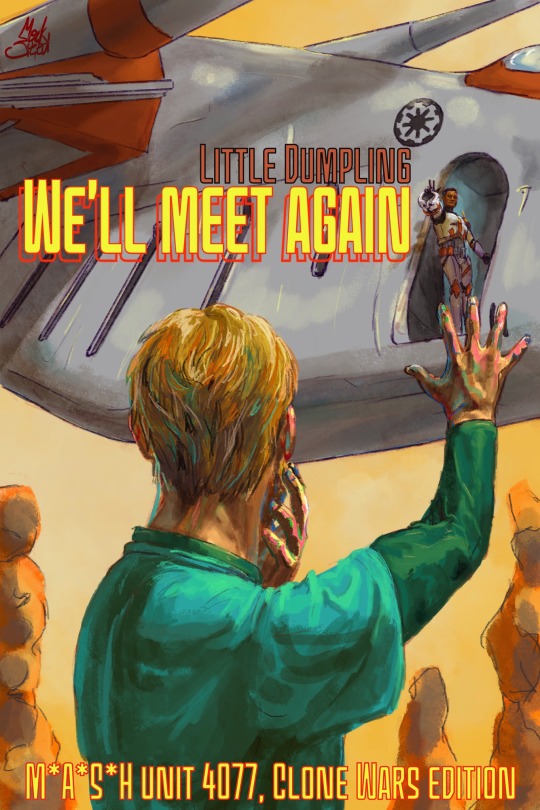
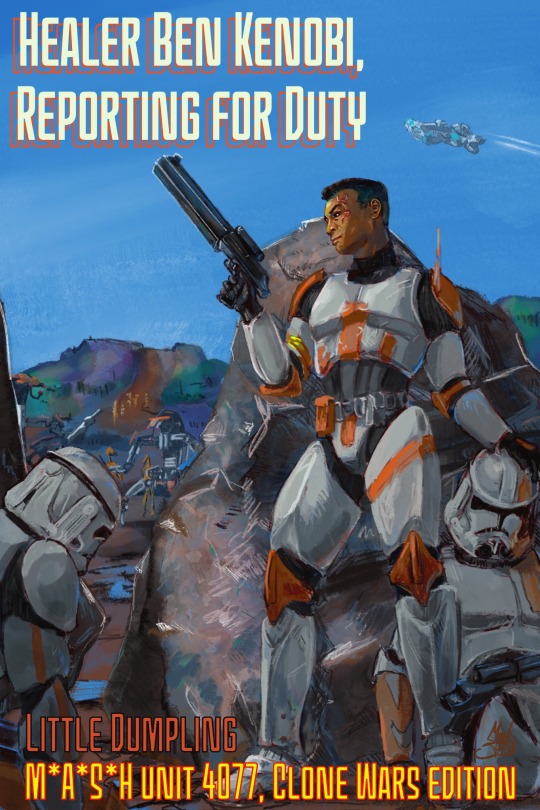
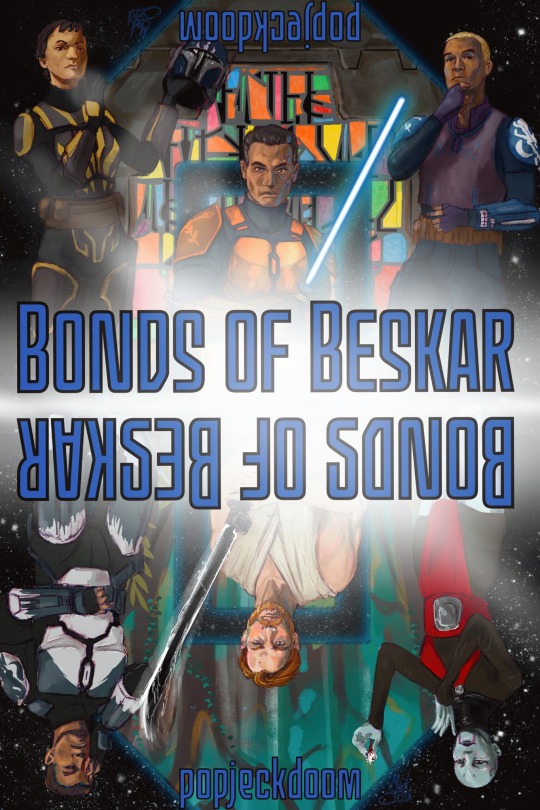
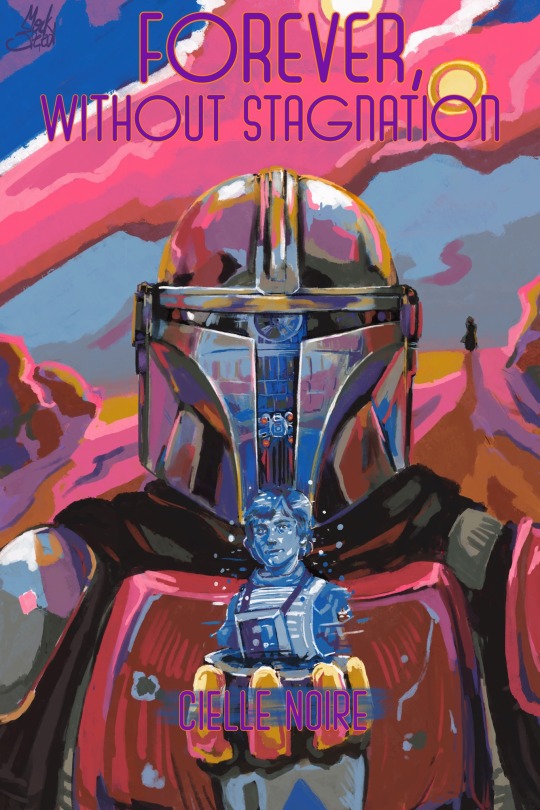
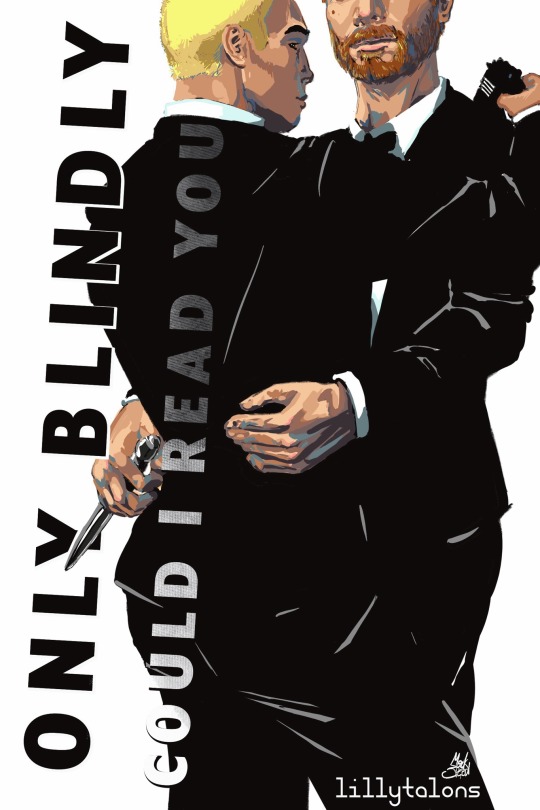
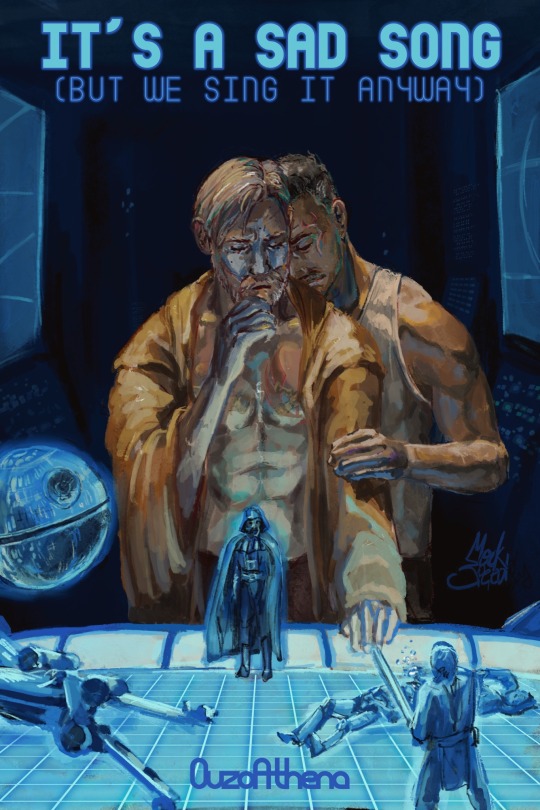
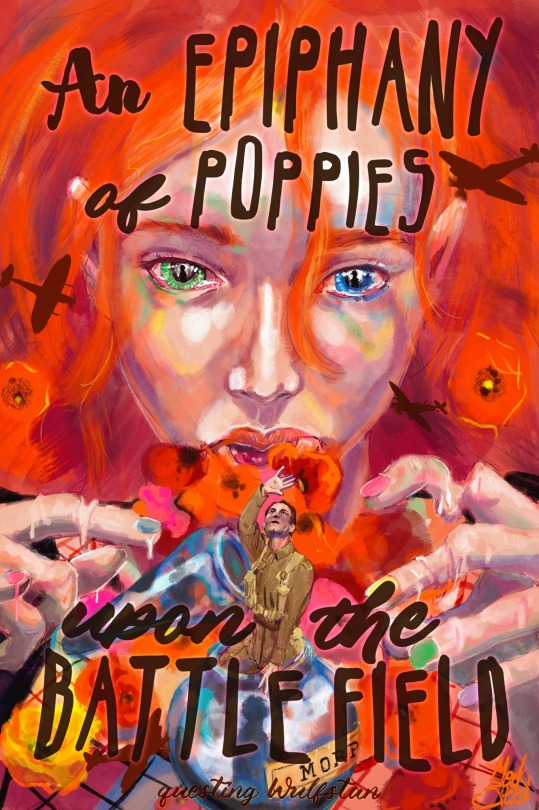
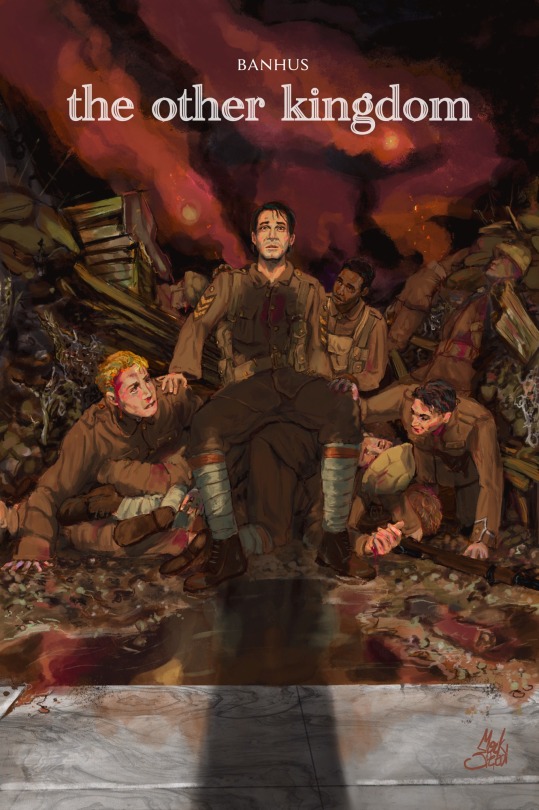
part 2/2 of my 2023 cover collection! This one only 75% star wars and 25% sandman. Check out my cover collection tag for big chunks of covers like this, or check out my big bang tag for a bunch of collab'd stuff! idk or do whatever you want!
oh, and happy thanksgiving for my american buds I'm thankful for getting to work with so many cool people
Links and summaries beneath the cut!
2023 cover collection
We'll Meet Again by @littledumplingwrites (art) (with more art by @punkascas)
When Initiate Obi-Wan Kenobi is assigned to AgriCorps, he goes to his Creche Master to ask why he hasn’t been assigned to a Service Corps better suited. As a result he’s sent to MediCorps to become a healer. Cue Obi-Wan becoming Ben Kenobi: a master healer and specialized surgeon who does philanthropic MediCorps work on the Outer Rim. It’s hard work, but good work and he enjoys what he does. But when the Clone Wars start, Ben is called away from his humanitarian work to patch up Clone Troopers and Jedi on the battlefield. And once he’s there, he meets a rising star in the Clone Army: one Captain Cody.
Or, Healer-Surgeon Ben Kenobi was called to the war front. And he wasn't too keen on going. What were the Jedi even thinking when they started a war?
That M*A*S*H Star Wars AU that I just couldn't get out of my head, so I wrote it. (However, you do not have to know or have seen MASH to understand this.)
Healer Ben Kenobi, Reporting for Duty by @littledumplingwrites (art) (with podfic by mengde)
Healer Ben Kenobi finishes his surgical work on one battlefield and finds out he has a new assignment: rendezvous with the 212th and work with the clone healers there. This makes Ben a little nervous, because his new boyfriend Major Cody is a part of the 212th and Ben hasn’t heard from him in weeks.
Can the two of them work through their relationship issues, even as the Separatist Droid Army closes in on their position? Can Cody learn to trust someone who isn’t a brother? And can Ben learn to put his partner’s care above his past hurts?
Can be read as a standalone. Also, you do NOT need to know anything about M.A.S.H. to read or enjoy this story.
Bonds of Beskar by @popjeckdoom (art) (with more art by Aliennotperson)
In a universe where the Mandalorian Empire never fell, but changed, Ad’be’alor Kote Vhett faces threats from all sides. His father, Mand’alor Jango Vhett has been cursed into a Majick sleep, and as Tor Vizsla and his supporters tear the Council of Clans apart, Kote is desperate to wake his father and reunite the Empire. In an effort to save his father, and his people, Kote Vhett offers “anything” to the person who can cure his Father’s curse.
Jedi Obi-Wan Kenobi may be the person for the job; only one issue--the Jedi have been in hiding for a thousand years, still hunted by Sith and Mandalorians alike. Can he keep his true identity secret long enough to help the Mand'alor... or will events conspire to reveal him before his mission is complete?
Forever; Without Stagnation by @noir-renard (art)
Din and Luke meet on Tatooine. Din and Luke fall in love. Din and Luke get married—
And then the plot catches up.
The Galaxy needs you, says The Force, and Luke believes it.
Din will understand, Luke thinks. It won’t take that long. What is a few years compared to the vow of 'forever'?
Only Blindly Could I Read You by @lillytalons (art) (with more art by @vanisketches
Rex's goal was to get into the organization, get the information, and take it down. Of course, no one had ever successfully infiltrated this empire, and most people had died attempting it, so it was easier said than done. But, the fact that a government agency had also sent in an agent, their best agent, was either a very good or very bad thing. Rex just happened to recognize them, and for some reason, Ben had decided that working together was the best option. What could go wrong?
It's a Sad Song (But We Sing it Anyway) by @ouzoa11-writes (art) (with more art by @impalafortrenchcoats)
Obi-Wan and Cody Kenobi have raised Luke for years and are at the center of the Rebellion when a new threat looms the horizon in the form of a new weapon. The tides seem to turn in their favor, even as they face new challenges along the way.
Or: Obi-Wan and Cody are soulmates who just want to see everyone survive. Their lives from Luke and Leia's nineteenth birthday to a confrontation with Vader alone.
Standalone though it is part of the "We Raise Our Cups To Them" universe
An Epiphany of Poppies Upon the Battlefield by @questing-wulfstan (art)
April 1940,
On a French battlefield, Hob Gadling doubts his will to persevere in being alive for the second time of his existence. He swallows morphine in the hope to soothe his horror-scarified mind, and summons a mirage of the stranger who occupied his thoughts as the patron of his immortality. In a Japanese psychiatric ward, Delirium of the Endless is alerted by Dream's irruption in her realm, who she found missing when she sought his company on her quest for the Prodigal. Disappointment overcomes her as she finds it was but an image of her brother conjured by a mortal, and so it does Hob when her eruption dismisses the vision. Delirium will not resign herself to her exponential loss of brothers however, neither will Hob Gadling withhold his aid from any entity in distress, whether the stranger or his younger sister ; they just might hold the might to liberate Morpheus between their four hands ...
The Other Kingdom by @banhus (art)
In 1916, Roderick Burgess successfully summons Death, and Hob Gadling wakes up in the trenches alongside three dead soldiers.
#dreamling#dinluke#codywan#star wars#obi wan kenobi#commander cody#captain rex#din djarin#the mandalorian#luke skywalker#obirex#rexobi#hob gadling#dream of the endless#delirium of the endless#cover collection#collab
377 notes
·
View notes
Note
hihi sorry to rant in your inbox but i hate when people use aven's line about jade that says her kindness comes with a price to make their relationship seem worse than it is. while the ipc is. well. the ipc i dont thinl it would benefit her to harm him like theyre both stonehearts AND hes her subordinate. personally i think the price he mentions is like, testing him like she did in her social media post with the ores. it certainly would be less incongruous with her want to guide those that come after her..
I think that people really struggle with Jade. They took one look at her dommy mommy appearance and her status as one of the top three in the Stonehearts and they just want her to be unrepentant evil soooo bad.
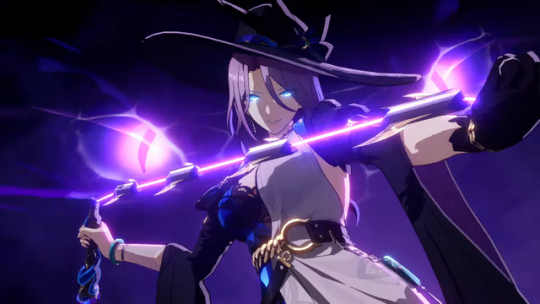
Don't get me wrong, she is definitely a master manipulator and she definitely has a specific personal goal she's working toward using the IPC as her vehicle to do so. Her overall idea of creating an endless vortex of desires that can't ever be sufficiently met is very Voracity-coded and not really the kind of idea a very well-adjusted person would be espousing. We have no idea how loyal she really is to the IPC's goal of aiding Preservation against Destruction in the War of the Aeons.
But she's also, over and over again, been painted as having "True Neutral" moral alignment in-game. She's literally xxxHolic's Ichihara Yuuko with a bad case of capitalism: She always demands a price, but never asks more than is fair.
It's literally Fullmetal Alchemist's first law of alchemy: Human kind can not gain anything without first giving something in return. To obtain, something of equal value must be lost.
All of Jade's exchanges are equivalent and none of her customers enter into a bargain without understanding the price they are paying. In fact, she won't even let Firefly try to make a deal at all without doing her research in advance to truly realize the extent of what she is asking for. Jade is inherently an honest businesswoman.

The issue is that greed is all-encompassing. The ability to have any wish granted is a temptation that virtually no one can escape in the end.
Therefore, I think the best way to understand Jade is as the Honkai Star Rail equivalent of Mephistopheles. In the legend of Faust, the eponymous Dr. Faust longs for more in his life--he is endlessly pursuing knowledge and power, but has hit the limits of his own ability. He meets the devil, Mephistopheles, who agrees to enter into a pact with him: Mephistopheles will fulfill all Faust's wishes while Faust is still alive, but then Faust's soul will belong to the devil when he dies. The deal is fairly presented. The terms are not unclear: If Faust agrees to the bargain, he knows what will happen to his soul in the end.
Mephistopheles doesn't trick him or force his hand when it comes to this bargain. Faust could say no. He could resist. But he doesn't. He agrees, because human greed and pride are simply that overpowering. He thinks he's smarter than the devil; unlike the thousands of others who have come before and suffered damnation for their deals with the devil, Faust thinks he is different, better than others, more deserving... The actual temptation doesn't come from the devil. It comes from human hubris.
Like Mephistopheles, like the serpent in the Garden of Eden, Jade merely presents the choice--it's humanity's endless desire that leads to the downfall.
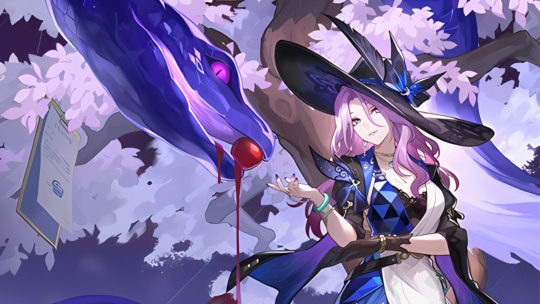
It's a snake and an apple and a contract for a reasonnnnnn, Jade haters.
So, I don't think that Jade represents any danger to anyone who can resist temptation. Firefly walks away from Jade's exchange entirely unscathed. Trailblazer isn't pressed into surrender.
But Aventurine?
To be honest, I think his relationship with her is a bit more complicated.
Aventurine likes Jade. She did him a solid when he was at his lowest in life. His character stories make it clear that he views her as, essentially, someone "safe" in the IPC, unlike other Stonehearts.

But... I do agree that Aventurine approaches Jade more cautiously than he approaches others. And I think that probably stems from a couple of different factors:
Jade has positioned herself as Aventurine's "pseudo-mother," and Aventurine responds to her as if she, indeed, a mother figure he has to obey. He is more respectful of her than anyone else we see him interact with in the game--Diamond and Opal get called by name, but Jade is always "Ma'am." Which is very close to "Mama;" this is not an accidentttttt. When Jade disrupts his banter with Topaz, Aventurine immediately does as he is told, hands over his room card, and simmers down. Even in joking social media posts, when Jade asks Aventurine to do something (judge the uncut jade stones she sent him), he does it even when she rejects his high demand for profit sharing.

But:
2. Jade actually failed Aventurine's moral litmus test. From the beginning of his adulthood flashbacks, we see Aventurine explicitly troubled by the fact that his human dignity was denied and that a market value was assigned to his existence. And not even a high value. He was sold for pennies. It's the ultimate mortification, and we can tell it is still bothering him to this day because even "future" Aventurine brings up the sting of that bone-deep insult during Aventurine's long walk through Penacony.
In response to the indignity, Kakavasha gave his original master a moral test: Kakavasha says that he'll go willingly into the hellscape of the death maze if his master will give him 30 copper Tanba, just half his market value. His master refuses, demonstrating that he does not view Kakavasha as a human being, worthy of any respect. By refusing this tiny, insignificant request, the master exhibits his utter moral depravity, from which there is no return. In response, Kakavasha ultimately kills him and takes the 30 copper coins he asked for (nothing more, nothing less) from his corpse.

When Kakavasha meets Jade, he then makes the exact same demand: He wants 30 copper coins and exactly 30 copper coins. At this point, it is very clear that--to Kakavasha--the coins are emblematic of his value as a human being. (I promise you, somewhere in his apartment right now are the 30 bloody coins he took from his master's cold corpse.) His freedom, his dignity, his worth... All of these things hinge on being able to acquire the original 60 Tanba coins. Thus, those who refuse his requests for the coins also symbolically refuse his request for basic respect, his request to be seen as an equal human being who deserves to not be reduced to mere pennies on a bill of sale.

And Jade refuses this request. She treats the demand for Tanbas like a paltry sum and instead ignores the specificity of the request to give a general "We'll give you riches beyond your imagine, more than you could have ever thought to want." But that isn't what he asked for. She stepped over the request he actually made in order to supplant her ideas, on her terms. Kakavasha made the tiniest, most easily completed request in the world, and in failing to actually just respect what he personally wished for, Jade demonstrated that she ultimately will not really respect him.
Just like his slave master, Aventurine represents a value on a page to Jade.
For this reason, even if she extends pseudo-maternal behavior to Aventurine and he laps it up like a starved kitten drinks up milk, we see that he remains more cautious toward her than he does to any other female character in the game. Aventurine comes across as more comfortable talking to Acheron than he sounds when he talks to Jade... Because in failing the most basic and seemingly meaningless test, Jade revealed exactly to what extent Kakavasha can--and cannot--trust her.
Does Jade actually mean Aventurine any harm? No, I really don't think so, and you're right, those who claim that she does are really over-exaggerating Jade's negative traits, mostly because they've almost universally got a strong anti-IPC agenda and hate everything from the IPC except Aventurine on principle. Everything in Jade's character stories points to her honestly wanting to develop the hidden talents of others, to "polish" rough cut stones into true gems, and to see her fledglings thrive. Kakavasha is someone she picked up out of the dirt and dusted off. If he excels, that means her faith was well-placed, her judgment was correct, and her team as a whole excels.
It's exactly like a business owner who takes great pride in producing a fantastic product. Only when the product succeeds can the business itself succeed.
But business owners see their products as objects, not equals.
Jade is a fairly neutral figure and I think she wants to see Aventurine grow and achieve greatness. But at the end of the day, their relationship is very predicated on the notion of investment (Jade puts up the original capital to make Aventurine great, and he repays her faith in him by generating wealth for the IPC). It is clear she just can't be trusted to value Aventurine as a person above a means of profit--and Aventurine knows (and accepts) that too.
128 notes
·
View notes
Text
Tension vs. Conflict: What’s the Difference?
Good morning everyone! It’s my birthday today and because it’s my birthday I thought I’d post today (that’s kind of an obscure reference to Star Wars Guy and his girlfriend lol)!
Conflict and tension in literature help build drama and keep readers engaged through the end of the book. Learning the distinctions between conflict and tension will help elevate your writing and make your storylines more engaging.
What Is Tension in Writing?
Tension in a literary context is the sense that something ominous is right around the corner. Building a large amount of tension as a writer keeps your readers engaged up until the end of the story. Mystery novels are full of tension and foreboding, and they generally feature tense scenes from beginning to end. Working within the genre of mystery writing is a great way to learn how to layer tension into your narrative arc. Good use of tension makes a story worth reading and keeps readers guessing.
3 Tips for Using Tension in Your Writing
Learning to build tension is no easy task. Even the most seasoned professional writers have trouble maintaining tension from beginning to end. Here are a few tips for using tension successfully in your writing:
Foreshadowing: An important part of building tension is using foreshadowing to build dramatic tension and keep readers on the edges of their seats. In Harry Potter, author J.K. Rowling uses flashbacks and backstory to foreshadow the eventual major conflict that will unfold between Harry Potter and the villainous Voldemort.
Inner conflict: Sometimes inner conflict and self-doubt can be layered in through character development and used to build levels of tension. In William Shakespeare’s Hamlet, the main character wants to avenge his father’s death but is beset by self-doubt, paralyzing indecision, and mental strain. As an audience, there is a sense of tension in every scene as we wait to see if Hamlet will act on his inner desire for retribution or remain stuck in a place of indecision.
A time limit: One great way to build tension in your story is to place a time limit on an action your character has to undertake. By adding the element of a ticking clock, you build tension and increase stakes. This is a common technique used in thriller novels and films as well as action and adventure stories.
What Are the Differences Between Conflict and Tension?
While tension simmers under the surface, conflict is generally out in the open—it's tension realized. Tension might be present an unspoken rivalry between the protagonist and antagonist or in the audience’s awareness of an impending disaster.
Conflict, on the other hand, involves an active clash; maybe the protagonist and the antagonist engage in a firefight or a heated debate, or maybe a character fights off a pack of animals or works to prevent climate catastrophe. Even if the conflict is interior—a character battling low self-worth, perhaps—it still involves opposing forces struggling for supremacy.
What Is Conflict in Writing?
Conflict can come in many forms. Conflict in a story can be a physical fistfight or a passive-aggressive war of words. All that is required for conflict is a manifestation of disagreement or incompatibility between a character and something else. Characters can be in conflict with other characters, with natural forces, or with society at large.
Another type of conflict is internal conflict. Conflict is one of the fundamental principles of narrative and creative writing. In order to write a story worth reading, you need characters whose point of view is in some way challenged and to whom bad things happen. Without conflict, you won’t have a narrative or any meaningful character arc.
4 Types of Conflict and Tips for Using Them in Your Writing
The kind of conflict you use depends on what your plot and subplots are centered around and what your main character wants and needs. New plot points generally introduce conflict or advance existing conflict. Here are some types of conflict to employ in your writing and a few tips about when and how you migh
Person vs. self: An internal conflict is a kind of conflict that only manifests within a character’s head. Though we may see this conflict dramatized through narration or dialogue, or play out in the protagonist’s actions, it is an internal struggle within a character.
Person vs. person: The simplest and most common form of external conflict is when two characters are in conflict with each other. The first stories we are told as kids generally have a clear good guy and bad guy. These stories are early introductions to person vs. person conflict. Person vs. person conflicts are very common, and it’s rare to find a narrative without an interpersonal conflict present at some point in the story.
Person vs. nature: Conflict between a person and forces of nature is a good example of external struggle that can raise the stakes in a story. Some notable stories that included conflict between a person and a natural force include The Old Man and The Sea by Ernest Hemingway and Robinson Crusoe by Daniel Defoe. Consider using person vs. nature conflict if you’re interested in writing a story with one main character and few, if any, supporting characters.
Person vs. society: Conflict between a person and society at large is a type of conflict often found in science fiction. Some notable examples of this type of conflict are found in The Handmaid’s Tale and The Hunger Games series. In The Hunger Games, Katniss Everdeen finds herself contending with a dystopian and oppressive United States government that pits citizen against citizen in order to keep dissent down and quell rebellion. If you’re interested in science fiction or narratives about social justice, you might want to consider exploring conflicts that pit an individual character against society at large.
#writing#writing advice#writing tips#original writing#writers on tumblr#writersconnection#writerscommunity#short story#storytelling#writersupportingwriters
2K notes
·
View notes
Note
Out of curiosity: do you believe Anakin was truly was the Chosen One or was it Luke the whole time?
Anakin. 1000% Anakin. I believe it's Anakin as per Word of God, as well, but I don't have the quote on hand right now.
Part of the weirdness over this is because of how the films were released, Luke is obviously the main character of the original trilogy of films, he's the one on the hero's journey, and there was never any mention of a prophecy in those films. So when the Prequels came out and made this whole prophecy thing for Anakin, it's understandable that people sort-of looked at it and went, "But if Anakin was the Chosen One, why is Luke the hero in the end still?" Which has obviously led to a bunch of theories that it was Luke all along, that Qui-Gon misunderstood the prophecy or just misapplied it to Anakin, or even that Luke BECAME the new Chosen One when Anakin fell (all of which are made worse by Rebels sort-of validating this take by having Obi-Wan claim Luke is the Chosen One). I get it.
But the entire purpose of Anakin's story to me only works if he IS the Chosen One and he just... fails. Anakin fails. He defies his own destiny and it destroys an entire galaxy. One of the BEST things about the Prequels is how hard they work to subvert certain tropes and narrative expectations. Padme and Anakin are forbidden lovers, but it's a toxic unhealthy love and the relationship is forbidden for good reason. Anakin is willing to burn down the world for Padme, but it's not at all romantic when the world is actually burning and it's going to burn both of them down with it. Prophecies exist, Chosen Ones exist, but prophecies can be DEFIED and Chosen Ones can fail if they're making selfish choices. You only get the happy ending from the prophecy if you're making the right choices.
So Anakin DOES end up destroying the Sith and bringing balance to the Force, but only when he makes a choice that's primarily SELFLESS in nature. He MIGHT'VE been able to destroy Palpatine the Sith way, but then he himself would still be a Sith and so the prophecy isn't actually fulfilled. There would be no balance in the Force while Anakin remains a Sith. So until he figures out how to leave his darkness behind, he'll continue to defy his own fate.
And that is a FASCINATING way to represent a prophecy and apply a destiny to someone without completely removing their agency or making all of their choices unimportant. Anakin's choices literally define the fate of the GALAXY because the prophecy only gets to come true when he makes the right choices. Theoretically, Anakin could defy this prophecy until he dies. Personally, I think that this is something that could happen. Anakin could make that choice, he could literally just defy the prophecy FOREVER and it would just never happen. It doesn't mean he ISN'T the Chosen One, he just chose incorrectly and so the prophecy never actually gets to come true.
I also like that this leaves room for other people to achieve the same end without being part of the prophecy. Theoretically, Palpatine could still be killed in other ways, even while Anakin's alive. The prophecy isn't stopping someone ELSE from killing Palpatine (or Anakin), it's just a LOT harder. We do see people more attuned to the Force kind-of stepping back from something they can feel is perhaps someone else's destiny or following someone specifically because they have a destiny for something, but the opportunity is there for regular people to step up where a Chosen One has failed. And it's one of the things I love MOST about the Star Wars universe, I love the way this worldbuilding works.
Luke is still a hero, obviously, he plays a major role in Anakin ultimately making that final selfless choice, his faith in Anakin and his refusal to kill Anakin and his adherence to Jedi compassion are what eventually help lead Anakin towards making the choice that allows the prophecy to finally be fulfilled. I'm not downplaying Luke's importance or his heroism at all, but I think it kind-of makes all of his choices even MORE heroic if he's NOT a Chosen One. He doesn't do these things because he was destined to do them, but because he's a good, kind, brave, strong person making the choice to do heroic things. He's choosing to do what he believes needs to be done for the greater good. He's just a regular person, with no prophecies to fulfill, having to step into the shoes of a hero because his father failed and threw the galaxy into chaos. How is that NOT more interesting than just saying Luke was the real Chosen One all along?
So you'll never catch me saying the Chosen One was anybody but Anakin in canon. It's absolutely Anakin and it'll always BE Anakin. You remove SO MUCH of the best parts of Star Wars if you take away that part of it.
266 notes
·
View notes
Text
a post on how yanqing's monologue in the 2.4 quest aligns perfectly with his character story (+ why jing yuan is a great father figure / mentor)

so we all know that yanqing is regarded as the best swordsman on the luofu (character story part I), and when you read his character story part II, it's obvious why:
When hunting near a distant star, the monstrously huge mechabeast Windguard created by the Denizens of Abundance was pulverizing defense forces as though they were ants. But this young boy met against it face-to-face, claiming its head and routing the enemy to the point of collapse.
As for subsequent victories: He broke the borisin's Devouring Wolf formation with Jing Yuan, beheading three Brood Lords. He also fought viciously against the wingweavers, ultimately sinking their almighty Cloudseizer Fleet... These are just a small footnote in the annals of his courageous swordplay.
yanqing mentions himself how he isn't like normal kids, but it's kind of startling and unnatural to read about how fearless he is. after all, he isn't like kafka--who literally cannot feel fear--he's just genuinely that good at his art

to jing yuan, yanqing's constant improvement is a reminder of how even though long-life species don't need to fear time decaying their body, their warped sense of time means they are often stagnate in their ideals and ultimately how they live their lives
"General... I finally... won."
The general pauses. He suddenly realizes that, compared to the boy trying to improve every day,
he himself has endured too many years and is used to stagnation.
the paradox though is that if you only win, that in itself is a form of stagnation.

so if you always succeed while being constantly praised from a young age, what happens when you lose for the first time?

from the average honkai star rail player's perspective, it's laughable that we see someone as decorated as yanqing be defeated multiple times in a row. it makes us wonder whether he even deserves his title, seeing how weak he is compared to jingliu, blade, and imbibitor lunae.
in actuality, this is a genius writing move. by bringing the player into the story right when yanqing starts losing, we begin having the same doubts and suspicions about yanqing that he is about himself. all the scorn and hatred he gets from the fandom are things i'm sure he's thought about himself.
what's even more interesting about yanqing is that most hsr characters are grown and had their early development offscreen, but we are experiencing yanqing's first big low firsthand, right along with him.

but believe it or not, this is exactly what jing yuan wanted.
according to yanqing's character story part IV:
Yanqing became an unrivaled fighter aboard the Xianzhou Luofu as his skills grew more and more advanced. Jing Yuan gradually began thinking about ways to restrain Yanqing's edge, to take him down a peg without curbing his confidence.
Too solid and it can shatter. Too sharp and it can blunt. More than just a sharp edge — a sword also needs a scabbard that can restrain it. In Jing Yuan's view, Yanqing has grown up exceedingly fast — beyond expectations. What Yanqing needs right now is not more strength, but the ability and experience of curbing that strength — something that can only manifest by the passage of time.
jing yuan knows exactly what can happen to those blessed with enormous power. unchecked strength and confidence is a double edged sword--it's precisely this overconfidence that got yanqing into fighting with blade/il and challenging jingliu, yet it's also one of yanqing's best features. what jing yuan wants is for yanqing to continue to believe in himself and be courageous, but also practice control and resilience, even after resounding defeat.
"All's equal in war, and sneak attacks are a good idea. It's too bad your sword is so focused on the flourish and can't conceal its form. Is this what they call youthful vigor?"

there are some things you cannot directly teach, and it's not as though jing yuan planned for yanqing to meet jingliu/etc. jing yuan believes that only time can teach yanqing, yet it's also tricky because for long-life species, time is not just a wheel pushing progress but a cycle repeating the same things over and over.
this is why i believe it's a testament to the stellar quality of yanqing's character and jing yuan's raising of him that so relatively quick after all of yanqing's failures...

...yanqing hasn't given up nor run away, but rather discovered that he no longer fights solely for an extrinsic reward--victory, honor, approval--and instead, for something much more permanent

this doesn't mean yanqing's going to stop throwing himself into difficult fights--just take his bickering with yunli as an example--but rather his perspective has changed. yanqing will enter battle even if defeat is inevitable and will keep on going even if he loses. he's continuing to improve, both physically and mentally.
(i also want to point out the juxtaposition of "letting go of everything" and "giving it my all" in yanqing's purpose above; it sounds contradictory but i think it means how fighting helps yanqing feel free and forget the weight on his shoulders, yet it's also a show of passion where he'll fight for his family/friends/ideals to the best of his ability and beyond)

to conclude, yanqing is an insanely complex and well written character, and i'm so happy that the 2.4 quest is exploring everything that has been set up for him so far. connecting this to the final character story i haven't covered yet (part III), i believe that yanqing is closer to achieving his dream than ever before:
It's completely natural for teenage boys to love swords, but a specific dream flickers and dances among the Xianzhou swords in his collection.
To become the best on the Luofu — no, the best across all the Xianzhou ships. To take the title of Sword Champion on the Luofu, and even take the title of Sword Preeminence across the Alliance.
Since the Sedition of Imbibitor Lunae, the title of Sword Champion among the Luofu Cloud Knights has remained vacant for centuries. Not that nobody wants to claim it, but for a rather more embarrassing reason:
The previous Sword Champion, a legendary swordmaster with 13 outstanding accolades, violated the laws of heaven, resulting in her name being wiped from the face of the cosmos. Even the prestigious title that she bore became a sore spot for others.
But for this vastly impressive teen, it's now time to turn over a new page in the annals of history and write another chapter.
ultimately, i think jing yuan said it best:
"You will soon be better than everyone, and that will only be the beginning..."
#ahhh this is my first time posting a full character analysis#took me way too long omg#yanqing luvrs pls enjoy hehe#honkai star rail#yanqing#jing yuan#jelloia analysis
97 notes
·
View notes
Text
So that whole interaction between Ahsoka and Huyang, where they talk about Sabine's choice to help the enemy find Thrawn (in hopes that she can then find Ezra) is clearly meant to be subtext for what happened with Anakin.
I mean change the pronoun from "she/her" to "he/him", tweak some of the names and...

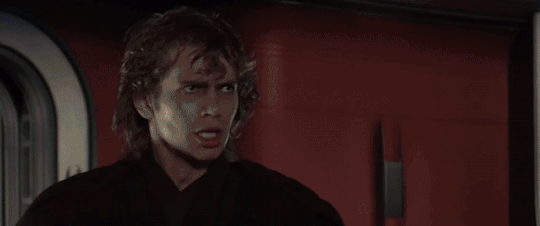
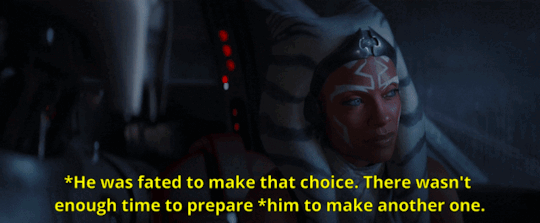

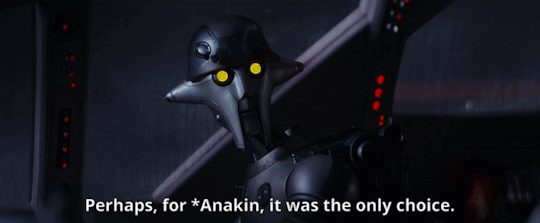
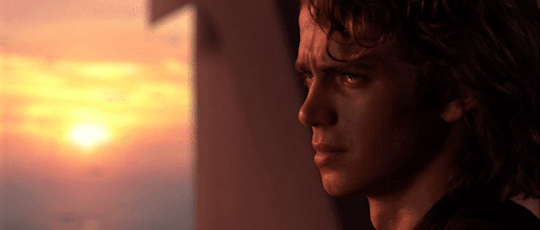
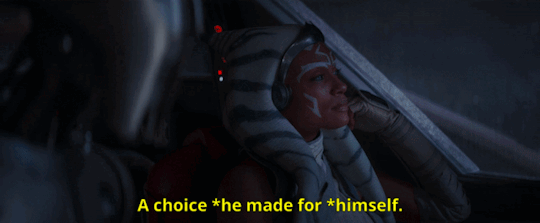
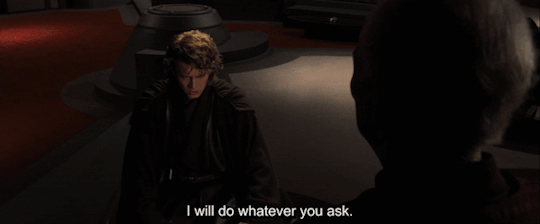
... it's just blatant.
The parallels were already clear in the previous episode, as pointed out in this post here, and it still holds true:
Sabine's struggle with attachment mirrors Anakin's.
We know Filoni's whole stance on why Anakin fell to the Dark Side: he'll usually acknowledge that Anakin was ruled by his attachments, got possessive of Padmé, but then adds:
"HOWEVER is loving that way really that bad?"
"HOWEVER he never stood a chance because Qui-Gon wasn't there to teach him properly and be the father Anakin needed."
I've already gone into why both these statements don't track with Lucas' intended narrative here and here... but I wanna touch on this notion that "Anakin wasn't trained enough to make a better choice."
He was.
You know how we know? Because we saw him overcome his attachments before.
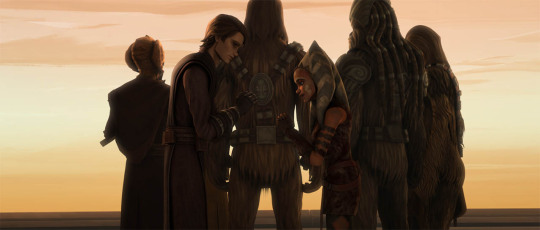
We saw him explain the theory of the non-attachment rule, before.
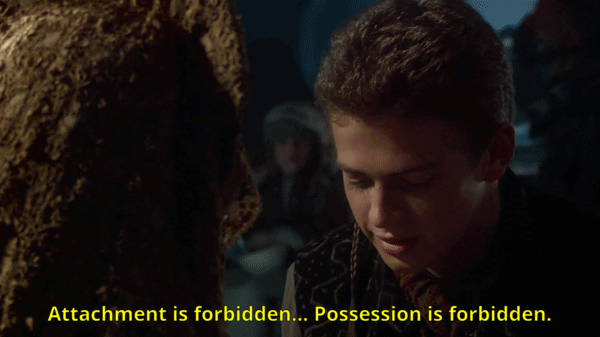
In fact, wee saw him pass down a lot of the Jedi lessons, in The Clone Wars, including being disciplined, following orders and not acting impulsively.


The issue is that - while Anakin knows the theory, even has a few minor successes applying it - he never builds the self-discipline needed to master it because... deep down... he doesn't want to.
This is partially because you got Palpatine telling him he doesn't need to, molding him into an arrogant, power-craving person... but the fact remains that Anakin made the choice himself.
Which Filoni acknowledges, sure... but not quite. The difference between his thesis and George Lucas' is that the latter picks a stance and defends it.
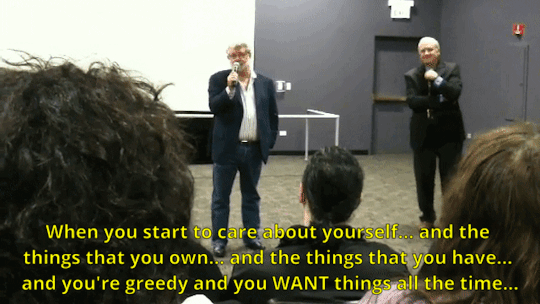
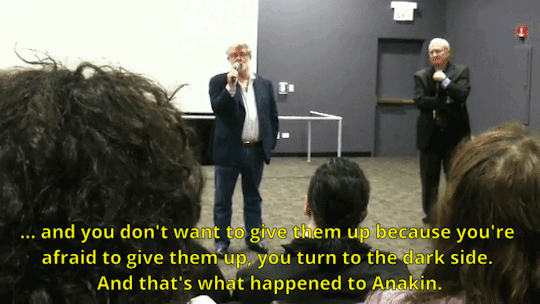
"He started out as a very loving and compassionate person. And as he progressed, it was his inability to control his temper, his inability to let go of things, and his quest for power that were his undoing."
- George Lucas, E! Behind the Scenes - ROTS, 2005
Anakin fell because he was greedy, just like any one of us can be.
Cool. Filoni, on the other hand, doesn't seem to land anywhere.
He dances around the issue (as can be seen by the debate between Ahsoka and Huyang, with no clear winner) and merely questions whether it's as simple as that.
Clearly he wants to justify Anakin's actions to some degree... but y'know, the narrative considers those actions so reprehensible that Anakin gets friggin' burned alive for it.

"I felt it was important that we actually see that happen so that we could see the consequences of these bad things that he did. […] He forces his friends to turn against him. Which is heartbreaking."
- George Lucas, “The Chosen One” Featurette, 2005
Because Anakin's actions are not meant to be justified.
It's easy to see why Filoni likes Anakin. One of the earliest tasks he had when writing The Clone Wars was humanizing a character whose sole functional purpose was to carry out a narrative about how:
"Without self-discipline, greed [can] force a character off the path to freedom."
- Micael Hearn, The Cinema of George Lucas, 2005
And Anakin is a very sympathetic character.
His flaws are flaws that we all carry.
Q: Is it fair to assess Anakin is kind of cursed by his own goodness/good qualities?
"I wouldn't say that’s true. He’s cursed by the same flaws, and issues that he has to overcome, that all humans are cursed with. There's a lot going on there. [...] The whole point is—and the reason I started the story where I did—is that Anakin is a normal, good kid. And how does somebody who is normal and good turn bad? What are the qualities, what is it that we all have within us that will turn us bad?"
- George Lucas, Star Wars Insider #52, 2000
But narratively, Anakin is selfish.
He doesn't want to save Padmé's life, he wants to save himself from the pain of losing Padmé.
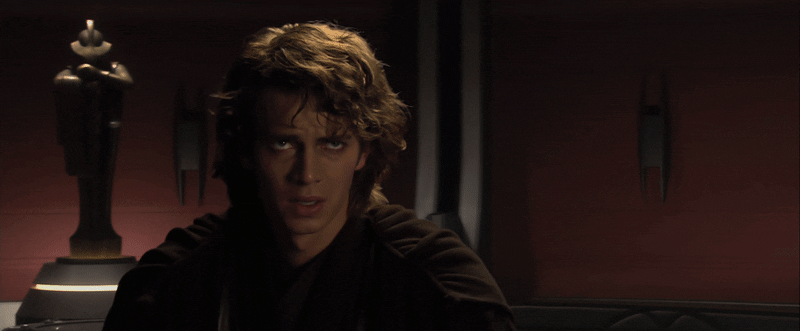
And while you're supposed to sympathize with him, you're not meant to agree with him. He's Darth Vader, the space nazi. He messes up and consequentially "leaves the Force in darkness" for 20 years, instead of ushering it towards the light in the chancellor's office, when he has the chance.
So to shift the blame and say that...
HOWEVER, Anakin didn't have the proper support system or training to make a better choice.
... when the whole point of the narrative is about taking personal responsibility and being selfless instead of selfish... well, it is missing that point.
He did know better. He just didn't want to choose better, so he convinced himself he wasn't able to.
#anakin skywalker#george lucas#dave filoni#ahsoka show#ahsoka series#ahsoka#ahsoka spoilers#huyang#sabine wren
1K notes
·
View notes
Text
I've been thinking a lot about the recent episode of The Acolyte and I have some ✨thoughts✨
(The Acolyte Episode 5 spoilers!!!)
I think the narrative is intentionally making us, the audience, doubt the Jedi and paint them as possibly being the bad guys specifically because now Mae is the one that's going to hear Sol's story. We were encouraged to doubt him and believe he's going to confess something awful about that night to Osha, but instead, I think what he reveals is going to make Mae (and us!) have a change of heart in some way and realize we were wrong. I doubly believe that will be the case because the one casting the most doubt on the Jedi is Qimir, the villain that's also been manipulating and using Mae's anger.***
Because how do you kill a Jedi without a weapon? Easy, you manipulate them, too. You make them paranoid and afraid. You make them doubt themselves and each other. You hurt them in every way that matters. Then you step away and let them destroy themselves. That's a basic Sith tactic, and I think that's exactly what Qimir is trying to do with Sol. Either Sol eventually gives in to the anger and hatred he felt and falls (I highly doubt it) or Qimir wants to get Mae or Osha to turn on/kill him (maybe now he wants to try and make Osha his acolyte instead. Emphasis on try). We've already seen Sol is unwilling to activate his lightsaber when facing Mae because he doesn't want to hurt her (that entire confrontation in the streets), and Sol would probably choose death rather than ever use it on Osha. The girl he connected with and saved and keeps a hologram of and smiles at and loves.
Something terrible obviously happened that night, but I don't believe for a second it was the Jedi's fault. However, it was terrible enough to scar Torbin and make him take the Barash Vow, to make Sol cry, and to make Kelnacca retreat to the woods and hide. Perhaps they all feel guilt for what they couldn't do. Perhaps they blame themselves, which looks like actual guilt from the outside.
But hey, I'm prepared to be wrong and say so, I just don't think it would be very good *Star Wars* storytelling if I am. For 2 reasons:
1) It wouldn't make sense in the existing story. We've seen that Indara, Torbin, and Sol are compassionate, kind people. We saw how soft Kelnacca was with little Osha. Sol radiates warmth, he believed Osha, and he wants to save Mae even after everything she's done. Indara died to protect someone else. For as impersonal and professional as she was when talking to the Coven, I don't think someone that would make themselves vulnerable in a life or death situation to save even one person would be willing to kill an entire community of people unless it was absolutely, completely necessary. I don't think self-defense would even necessarily qualify, I think the Jedi would do everything they could to retreat first. The one caveat I can think of is if someone attacked Torbin. Then I could possibly see Indara as a Master protecting her Padawan, something Masters would give their own lives to do (as we see repeatedly during Order 66), and the situation escalated. (Could be why Torbin is injured and blames himself?)
2) The point of the story in Star Wars has always been that the Jedi are the good guys. They hold up the ideals of goodness and peace, and even though, individually, they sometimes stumble and fall short of it because they're still flawed, mortal beings, they always try to reach for the light. ("Jedi cannot help what they are. Their compassion leaves a trail. The Jedi code is like an itch.") If a group of them has done something unspeakable, unforgivable, and then covered it up (or worse, the Order covered it up), how do we ever trust the Jedi as the good guys again? It goes against everything they believe in. It goes against the story George Lucas created (or has ever said about how Jedi and the Force work). If this is the story being told, it will be a very bad Star Wars story, and I have to hope that's not the case.
***((Side note: The guy that just killed 6 Jedi and a Padawan did not make a good point with "You brought her here." Sol brought Jecki there, with many other Jedi, as her Master to teach her more about how to resolve conflict thinking they were only confronting Mae. And even then, Sol didn't make Qimir confront the Jedi and kill Jecki. Jecki's death is entirely Qimir's fault since he's the one that killed her. Also for a Sith to have "freedom" to be themselves is to allow them to do evil things through the Dark Side, which is ALWAYS evil. Full stop. The Dark Side twists and corrupts. That's how the Dark Side works. Qimir isn't some guy being oppressed because the Jedi are power hungry and unwilling to share the Force. Fascists shouldn't be allowed the freedom to be fascists.))
#the acolyte#the acolyte spoilers#master sol#qimir#osha aniseya#mae aniseya#jecki lon#yord fandar#master indara#master torbin#master kelnacca#star wars#star wars the acolyte#the acolyte positive
79 notes
·
View notes
Text
Every Episode of Miraculous Ladybug Season 5 Ranked (Part 2)
Part 1
(This site's stupid 30 images per post forced me to do this, so thanks for nothing, Tumblr)
#14: Transmission

I swear, I'm not doing these on purpose. This is just how I've been ranking the episodes.
Like I said in the last part, this episode just did not need to happen. The first half is cheap melodrama between Marinette and Adrien and the second half is a run of the mill Akuma fight with two different heroes. This is the story that seriously warranted two parts this season?
I just can't stand the fact that Marinette and Adrien gave up their Miraculous so easily here. Maybe if it was Season 2, Season 3 at the latest, I'd buy it, but near the middle of Season 5? They honestly view their love lives as more important than the battle with Monarch. If it was anything else like the stress or physical danger, I'd also be understanding, but Tikki and Plagg decide that Marinette and Adrien are so miserable that they need to be happy by losing their Miraculous without a fight. Remember, this was just two episodes after “Reunion”, which showed Joan of Arc was a Miraculous holder. So fighting in the Hundred Years' War didn't get so much as an ounce of concern from Tikki, but teenage angst is too much for her little heart to bear?
Maybe it's the benefit of knowing this won't be permanent, but the issue I have is how much the show draws this out for so long, as if the audience is supposed to buy it. “It's really happening, guys! Ladybug and Cat Noir won't be the stars anymore, we swear!” This kind of plot can work under the right circumstances. All you needed to do is at the very least, make it something they choose to do instead of their Kwamis taking their Miraculous away so we can see them weigh the benefits of giving up life as a superhero in ways that aren't exclusively about their love lives. I'd even buy it if it's something Ladybug and Cat Noir actually agreed on before quitting.
While I can sort of get Alya becoming Scarabella due to her experience with the Ladybug (even if she chose to give up using any Miraculous at the end of Season 4), Zoe getting the Cat just feels like the writers put a bunch of names in a hat and picked hers. The two just don't have as compelling a dynamic as Ladybug and Cat Noir do, because they don't get a lot of time to know each other. Alya and Zoe have almost never interact with each other, so the masks don't really shake up their relationship, because there's no relationship to speak of.
Also, the Akuma here was really forced. We know nothing about this new character while the show acts like we're supposed to know who he is based on some minor hints with Nora calling earlier. While I will give the show credit for arguably giving us the most powerful Akuma of all time due to being both a man and a bear, he's as forgettable as a villain as Kitty Noire is as a hero.
Just about nobody here comes out smelling like roses in this episode. The Kwamis are morons for caring about one ship becoming canon, Marinette and Adrien are selfish cowards for giving up their Miraculous with little hesitation, their friends are ignorant buffoons for thinking some random attempt to get Marinette and Adrien to talk will somehow seal the deal, and Alya and Zoe are idiots for not thinking that they should take off the shiny ring that tracks their every movement. It's a terrible episode, and the only reason why “Deflagration” is ranked higher is because it didn't irritate me as much as this one did.
#15: Determination

And now we're onto the really bad episodes this season.
This episode is pretty much what you've come to expect by Season 5. People keep forcing Marinette into situations she's clearly uncomfortable, and we're supposed to just laugh at her anxiety, because we still have eight episodes to go before the show decides to take her mental health seriously.
What makes this episode really sting for me is that it's Luka and Kagami that are forcing Marinette into these unfunny antics this time. For the most part, they never really stooped to this level and didn't try to force anything with their respective love interests until they had trouble in their relationships that required them to communicate. But now, even though one knows Marinette and Adrien are superheroes while the other is usually very blunt with her feelings (at least, before she became this season's next victim), they're going to try forcing Marinette and Adrien to spend time together even they both know they have feelings for each other and MY GOD, THIS IS SO STUPID! It's just a cheap excuse for more pointless shenanigans that stopped being funny years ago.
Yet somehow, that's not the worst of the Love Square drama this episode. It's here where we learn that Adrien fell in love with Marinette over a season ago, during a scene where she violated his personal space. In addition, Adrien somehow showed no signs of attraction to Marinette until the plot demanded it, and came right after another episode showing him falling for her. Why not make it the fake confession Marinette practiced with Cat Noir in “Glaciator 2”? The kiss Marinette gave Adrien at the end of “Heroes' Day”? I'd even take another umbrella scene callback like in “Mr. Pigeon 72”. But no, it's the statue scene that the writers decided on. It's like they noticed all the criticism Marinette got in that episode and were like “Joke's on you! Adrien actually liked being lusted over like an object!”.
And then the masks come on and make things even more convoluted. Adrien at least got to reflect on the events of a previous episode to explain his new feelings for Marinette, but what caused Ladybug to suddenly fall for Cat Noir after four seasons?
youtube
The writers don't even bother with an explanation for this. Ladybug spontaneously becomes attracted to Cat Noir with absolutely no foreshadowing, buildup, or even callbacks to earlier episodes. The writers either wanted to complicate things one last time before Adrienette became canon, they wanted to bury the Ladynoir conflict arc from last season in the sand, or the most likely option, a combination of both.
The idea of the public turning on Ladybug was an interesting one to take, seeing how she's been universally beloved for the past four seasons. But despite hinting at it in “Multiplication”, this is the farthest is goes, and even then, guess who's behind it? You can't keep raising points against the main characters if it's only Chloe who does it. It doesn't open debate on the story and essentially tells the audience that they're wrong to agree with her, no matter what kind of point she makes.
As dumb as the way it happened was, Ladybug still screwed up and endangered the city by losing the other Miraculous, but we can't actually challenge children by acknowledging that the hero actually did something wrong and needs to grow as a person. We need to use a recurring character as a strawman to tell the audience that only bad people think this way! Way to remove any interesting internal conflict, writers.
The Akuma was pretty weak, just being an older Puppeteer, down to using wax statues like what happened in “Puppeteer 2”. The army of wax heroes could have been interesting, but there wasn't enough time to do much with the idea. The one thing I liked was how the Ox Miraculous' Resistance was used. It felt like an upgrade instead of a core power Manipula got.
This episode pretty much set the stage for a new level of frustrating Love Square drama this season, and it was one of the season's first outright awful episodes.
#16: Conformation
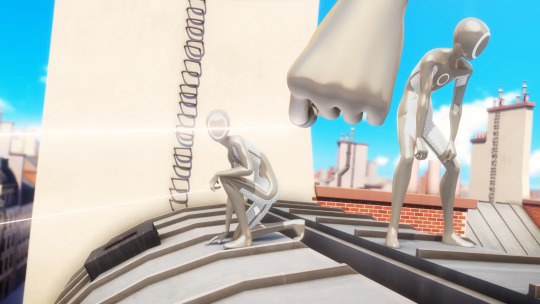
The only reason this episode isn't at the bottom is because the rest of the ones on this list are far worse by comparison. Make of that what you will.
Like most season finales, this one continues the tradition of being better at buildup than actual execution. Gabriel's plan is pretty decent, even if it's just Heroes Day on a global scale. He utilizes his public influence and business skills to plan out a plan to get almost all of humanity working for him. While I don't like the Miraculized, I still think Gabriel being on top works here, especially since he's not going out into the field like the last three finales.
But other than an okay evil plan, this episode is still pretty bad. Marinette being infected with nightmare dust only happens to get her to the Agreste manor because the writers forgot that Marinette learned Gabriel was Monarch last episode. It could have been a decent way to up the stakes by showing Ladybug not being at 100%, but like everyone else, she just fights off the nightmare dust and doesn't have a single problem during her fight with Monarch. In general, the nightmare dust isn't really utilized well, only being an excuse to bring out the Miraculized. It doesn't impact everyone fighting off the Miraculized, and there's no lesson or theme about fear that's conveyed here.
Speaking of nightmare dust, I'm pretty sure the only reason why it was introduced in the first place was to bench Adrien, which is still easily one of the dumbest decisions the show has ever made. While everyone else had no problem resisting the nightmare dust, Adrien is just physically incapable of doing so because of some half-assed character arc the show pretended happened. So either Adrien got a more potent dosage of the nightmare dust, or Adrien's just too weak to actually overcome his fears. “Sandboy”? Never heard of it! The fact that the writers also tried to claim they were being subversive with fairy tale tropes and cliches didn't help, since it devalues Adrien as a character even further. He's not a superhero and Ladybug's closest ally. He's just some damsel in distress who needs to be saved. Let me just remind you, if the genders were reversed, this would not be seen as some bold move, but the same overused cliche trying to be something new.
I already talked about my problems with Nathalie in “Passion”, and the stuff she does here isn't really different. Despite enabling Gabriel for five seasons, the episode has the balls to act like Nathalie always had morals and is appalled by Gabriel planning to sacrifice someone to save his wife. Just remember, “Passion” established that Nathalie had a history as a treasure hunter, so this is like Indiana Jones not knowing what the Holy Grail does. Nathalie only got dumber than in “Passion” because she somehow thought she could take on a supervillain with nothing but a crossbow and a body that already has one foot in the grave. And just like Felix, Nathalie can't even apologize to Ladybug for the aiding and abetting a terrorist thing. Between Nathalie, Felix, and Gabriel, does using the Peacock Miraculous just make you an idiot?
While the buildup is decent, it's just not enough to really get audiences excited for the second part.
#17: Representation
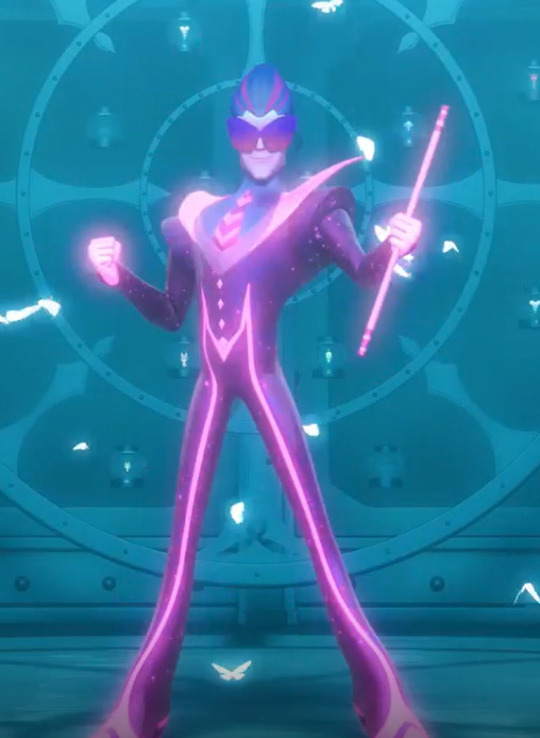
This episode is yet another example of the show's double standards.
Without going into detail too much, this episode came right after “Revolution”, the one that essentially portrayed Audrey taking control of Chloe's life as a karmic punishment. What happens in this episode? We learn Felix's father literally took control of his life and it's portrayed as wrong as child abuse should be. That's why this episode is still better than “Revolution”. It at the very least understands how serious child abuse is, and tries to tell Felix's story with as much dignity as two teenagers in white onesies can have.
With that being said, there's a reason why this episode is as low as it is. The Sentimonster play used to tell Marinette about Felix is just so stupid. The sets and costumes look ridiculous, it's hard to take the story seriously with Felix and Kagami doing all the voices, and most of it is unnecessary since the whole point is to tell Marinette that Gabriel is Monarch... something that the writers decided she needed to find out on her own in the next episode. It comes across less like Felix trying to alert Ladybug to who Monarch really is and more like he's just trying to justify his own actions. Hell, the actual reason he decided to tell Marinette about Gabriel was because he and Kagami were worried about their own relationship being ruined by him. And yet somehow, Ladybug lets him on the team at the end of the season.
The stuff with Adrien was also pretty dumb. It's cheap fanservice that reminds the audience of Cat Blanc when none of the characters should know who Cat Blanc is. You can call him Anticat all you want, but everyone can see that he's just Cat Blanc with blue hair. It's bad enough that this was what all the times Cat Noir almost Cataclysming people this season was meant to lead up to, but this is pretty much the reason why Adrien is benched during the finale.
This episode really shows how desperate the writers are to make people take this show seriously by showing serious topics like genocide and child abuse, as if the show didn't already ignore the horrible implications previous episodes (like the very last one before this) raised and will continue to raise during the season finale. So much of the episode is just dark for the sake of being dark. It's nothing too horrifying for children, of course, but the issue is how obvious it is that the writers are trying to raise the stakes right before the season finale and show how mature the show's writing is. For lack of a better term, it's this show's equivalent to “Ow The Edge”.
#18: Revelation
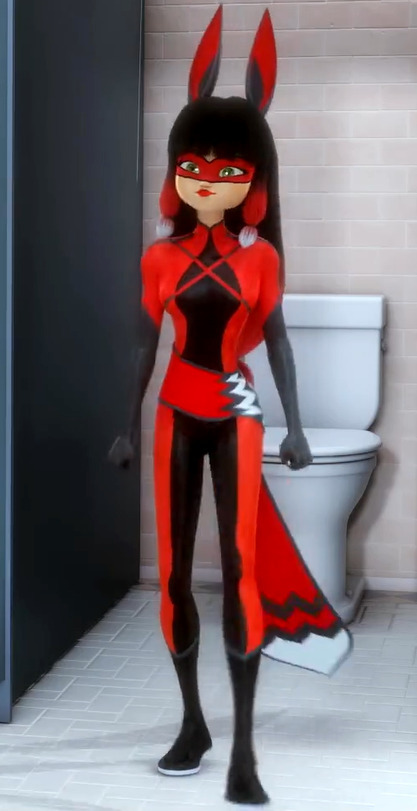
Get ready for the episode where the writers abandon all attempts to be subtle and create an episode specifically to attack people who think Chloe isn't the most evil character on the show. Because how dare they be optimistic and try to see the good in people! What do they think this is, a kids' show?
While a big problem with the Lila episodes was how stupid the class is, this episode made it so Marinette got to join in on losing brain cells too. Despite outright admitting to neglecting her duties as class representative (as absurd as it is to be in charge of notifying teachers about student progress they should be aware of), we're supposed to agree with her for not telling her teacher about Chloe cheating. Not only does this make no sense since you'd think Marinette would want to see Chloe get punished, but her claiming that all Chloe does is abuse her privileges loses any point to it because Marinette admitted to not doing her job as class representative, making her just as lazy as Chloe and unintentionally helping her through not telling the teachers. And that's not even getting into how many times Marinette has broken the secret identity rule despite also being the one to enforce it the most as the Guardian.
If the episode at least admitted to Marinette having personal issues that prevented her from displaying any form of professionalism towards Chloe (especially since this episode takes place after “Derision”), that'd be fine. Sometimes, people just can't let bygones be bygones and let their emotions dictate how they handle things. If she willingly resigned from her position by admitting she was just as at fault for Chloe getting as far as she did with her cheating, that would have worked. Instead, the episode does the same things it did with Adrien for the last few seasons: Go out of its way to vindicate Marinette's complaining and never even consider the idea of her being wrong in the slightest.
It's also hilarious to see Ms. Bustier act like an actual teacher for once and plan to work with Chloe to help make up her missed work, but portray it as a bad thing because in Marinette's eyes, that's not a punishment. Since the school year is almost over, Chloe will have to attend summer school at best and be held back or even expelled at worst. How the hell does that not count as a punishment, Marinette?
And don't forget how she gets not one, but two separate scenes insulting people for being idealistic and not wanting to write off people as beyond saving, the second one being copied from Astruc's Twittter.
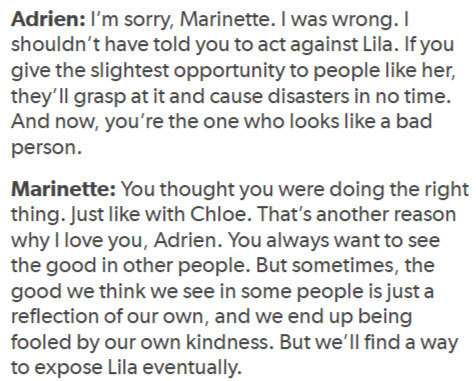
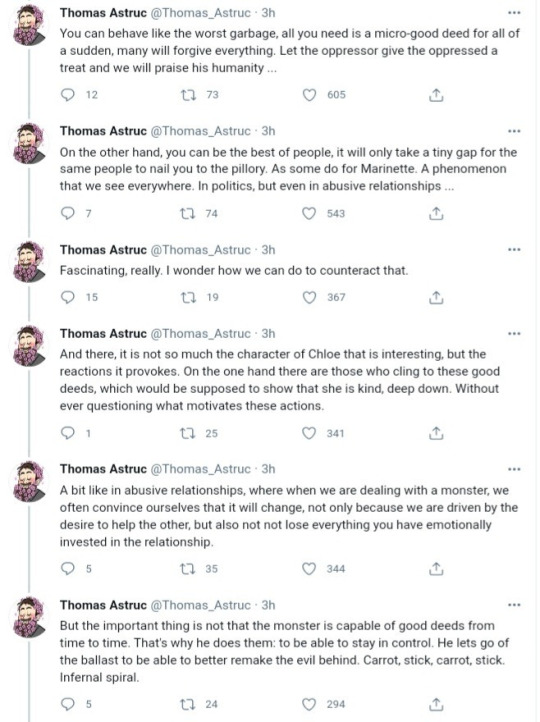
And remember, this was right before a string of episodes where characters were able to change their ways, including Sabrina (Chloe's accomplice), Andre (Chloe's enabler), and Gabriel (Chloe's supervillain contact). How the hell is Chloe the only one being written off as irredeemable when she didn't pull off any of her evil plans without help? You can still punish Chloe. All I want is for the other characters to be punished as well.
But let's talk about the main event for this episode: Lila. In one of the most confusing “twists” in the show's history, she's now an identity thief who lives with three different mothers. Why? Because the writers have no idea how to hype people up for her being the main villain for Season 6, so they think just making her mysterious for the sake of making her mysterious is enough to build her up as a villain. It's like the writers realized Lila had absolutely zero resources of her own, so they felt like they needed to establish her as an evil genius to compensate. “Who cares if there's no logical explanation for how she's gotten as far as she has despite constantly boasting about her celebrity connections in public? We have to make her vague and mysterious, damn it! It worked for Judas Traveller and Kaine, didn't it?”
This episode takes multiple shots at fans and tries to make Lila seem more compelling than she actually is. It feels more like damage control than an actual plot-relevant episode.
#19: Illusion
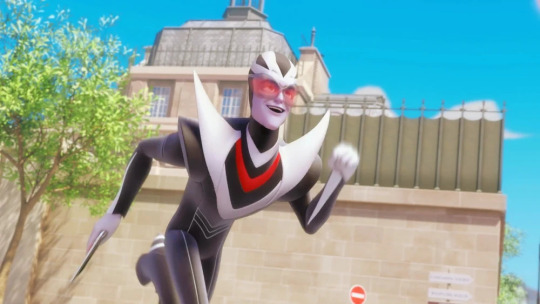
Want to see the main characters acting like idiots for almost a half-hour? No? Too bad!
So much of this episode's conflict, the characters trying to investigate a possible lead related to Monarch, comes from everyone making stupid decisions. Nino tries to get one of the most influencial men in Paris akumatized, talks about it in public, falls for his trick, and lets him into his secret alliance. This season really cemented his role as the Zapp Brannigan of Miraculous Ladybug with how incompetent he is. If you really want to start portraying Nino as a tactical genius, maybe you should actually show him doing something smart instead of getting outsmarted by obvious tricks.
Of course, the other characters aren't immune to Nino's stupidity either. Marinette, Adrien, and Alya just go along with his asinine plan to get Gabriel akumatized, never question his logic, and ultimately still go along with the Resistance despite how obnoxious their leader is. The worst part is Ladybug not recognizing her own partner being stung by Venom... when they're fighting someone with access to over a dozen Miraculous. I know Cat Noir was born with glass bones and paper skin, but I don't think he literally freezes in terror when he's scared. And of course, Ladybug never questions the tiny invisible men who stunned Cat Noir after this scene.
The cafeteria scene is something that should really be cited as an example of how terrible this show is with acknowledging continuity. You thought there would be some compelling drama discussing the secret identity rule and all the double standards it has? NOPE! It's a funny joke about how confusing the identity stuff is at this point. The fact that Nino somehow doesn't understand the concept of secret identities in this scene is yet another reason as to why he isn't even qualified to lead an anime club, much less a resistance against Monarch.
The idea of Monarch using an illusion to fight Ladybug and Cat Noir was an interesting one, but it still had some holes. For one thing, what if the two heroes can't dodge one of the illusion Collector's attacks? What if they're fast enough to try tying him up, only to dispel the illusion? The entire plan pretty much relies on the fact that Ladybug and Cat Noir are too slow to catch the Collector.
But one scene that has only become more questionable after the finale is Ladybug trying to reach through to the illusion Collector. Like several episodes this season, it comes across like the show is spitting on idealism and wanting to solve problems peacefully because Monarch tricked Ladybug into believing he willingly rejected an Akuma. Remember kids, if someone says they want to change, it's really a trick as part of an evil supervillain's plan to maintain his secret identity.
This episode is like a microcosm of everything wrong with Season 5. Poor morals, characters acting like idiots, shooting down any potential for plot development, and being told characters are right when their actions say otherwise.
#20: Confrontation
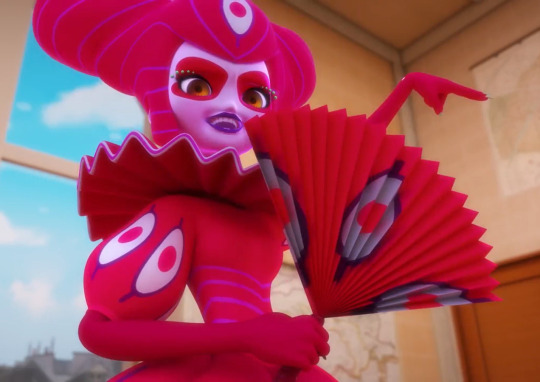
Ladies and gentlemen, I give you the episode where the writers just gave up.
There is just so much that happens in this episode that the writers cram in. There's Marinette's “final” confrontation with Lila, the battle with Reflekta, Sabrina's redemption, Juleka's character development, Ms. Bustier's character development, Mr. Damocles' character development, and the reveal of Lila's true nature. I don't think I need to tell you that the writers struggle to make all of these plot threads work in less than a half-hour.
First off, Marinette and Lila. The previous episode implied that Marinette let Lila have this short-term victory because she had her own plan to expose her. This episode puts that plan into action. See, she has the genius idea of going along with submitting school application forms to Lila and Chloe with no actual countermeasure in place, waiting for Sabrina to have a sudden change of heart so they can work together to expose Lila and Chloe through a bathroom peephole. This is the kind of tactical intelligence that will be studied in the history books, let me tell you. There's just no weight to Marinette and Lila's final battle of wits because there isn't any. There's no series of gambits or scenarios that actually pit their minds against each other, so you don't get a lot of satisfaction from Marinette's triumph over Lila. It doesn't help that there's more focus on Sabrina than on Marinette, but I'll get to that later. Even the actual payoff is anti-climactic. Most of the class' apology to Marinette was deleted because Mr. Damocles using a Magical Charm shield was just too important to leave on the cutting room floor according to the writers.
This episode really shows just how Marinette's classmates are like NPCs in the Lila-centric stories. They don't second guess Lila's accusations due to their past experiences with Marinette, and as soon as Marinette's name is cleared, they instantly apologize to her and don't even think about how easily they were fooled by Lila and Chloe. The worst example is Alya, Marinette's confidant and someone who was trusted to temporarily use the Ladybug Miraculous last episode, falling for this and not trusting Marinette. My sister in Christ, your friend goes out and saves lives on a weekly basis at least. How can you fall for Lila's story? This is why I think the Lila episodes should have all been set pre-Season 4, so Alya falling for Lila's lies is a little more believable since she isn't already in on Marinette's biggest secret.
I also have to roll my eyes at how melodramatic the talk about everyone's “futures” is. Yes, I don't know a lot about the French education system (If there's anything I'm getting wrong here, don't hesitate to let me know), but I don't get why they're treating their high school choices like such a big deal. Maybe if it was college, I'd get it, but high school? Why can't you just transfer if it doesn't work out? But then again, this is the same show created by a man who thinks school uniforms are a sign of fascism.
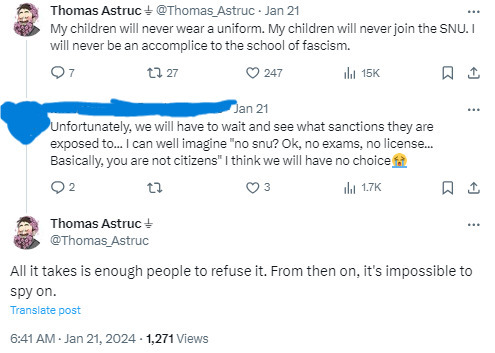
THIS IS WHAT THOMAS ASTRUC ACTUALLY BELIEVES.
Speaking of futures, this episode also showed just how little the writers cared about Adrien at this point, with how a supposedly heartwaming moment is him having no plan in life other than Marinette. I know this might seem weird given my problem with him last season was his refusal to think about anyone but himself, but there's a difference between wanting someone to follow orders without complaining and giving them absolutely no motivation outside of their significant other. And once again, if you swap the genders, this becomes sexist as hell.
But the big problem comes in the form of how the side characters are utilized. I don't know why the writers decided to focus on developing characters like Sabrina, Juleka, Ms. Bustier, and Mr. Damocles with five episodes left in the season. This should have been done in earlier episodes, not in the middle of a major story arc. I'm just left not caring about the development because it takes away from the conflict between Marinette and Lila, to say nothing about how little Adrien and Alya contribute to the story.
To me, this episode feels like the writers had no idea how to make Marinette outsmarting Lila into an episode, so they crammed in all these half-assed character arcs to pad out the runtime. While “Revelation” personally upset me more, I personally think this is the worse episode of the two from a writing standpoint.
#21: Revolution
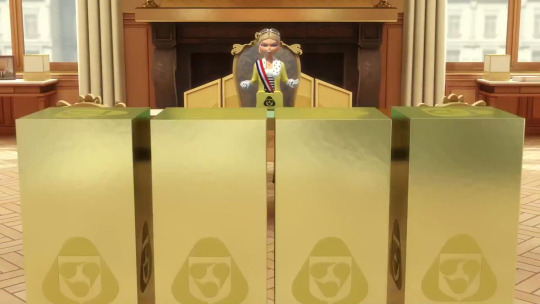
Given how often I've criticized the way Chloe has been handled over the years, I bet you're surprised that this one isn't at the bottom of the list. You'll be even more surprised to learn that I think Chloe is one of this episode's saving graces.
This episode (along with “Derision”) provide an example of the Chloe we should have gotten ever since Season 3 ended: A villain who's allowed to be a threat while still being funny. So much of the past two seasons have done nothing but portray Chloe as nothing but an incompetent joke, but here, near the end of the season, she's in a position of power and is taken seriously. The episode does a good job showing how tyrannical Chloe's rule as Mayor is while still making it funny and in-character for her. She uses her power on frivolous things because she's a teenage girl who doesn't understand the complicated issues that come with politics. It's also why her idea of punishment involves detention, because it's something she's more familiar with as someone in middle school. Of course, even the episode all about Chloe ruling Paris with an iron fist isn't stupid enough to actually let Chloe be a compelling antagonist. No, we need to constantly remind the audience that Chloe is being played, as if we're supposed to see her as nothing more than a pawn even though the show still wants us to see her as an irredeemable monster.
Putting aside that one speck of something interesting, this episode is still incredibly bad. So much of the story is dependent not on how smart the villains' plan is, but rather, how lazy the heroes are. Not only is there not a single moment where Ladybug and Cat Noir acknowledge that the whole reason why Chloe was able to take over as Mayor was their fault, they act as if Chloe abusing her power to make everyone's life a living hell isn't enough of a reason to stop her. What kind of Prime Directive bullshit is this? YOU JUST HELPED SOMEONE LEAD AN INSURRECTION AGAINST A POWERLESS CIVILIAN! HOW IS THIS ANY DIFFERENT?! If there was at least something involving Ladybug and Cat Noir taking responsibility for what happened or at least showing that they played a part in this (especially since they “grow up” in this episode), I'd get it. Instead, because this is Season 5, our heroes are perfection incarnate, and can't ever be wrong. Even when they finally decide to get off their asses and stop Chloe, they didn't know she was akumatized, and nobody seemed to care before Chloe blurted it out, so Ladybug and Cat Noir have no excuses for slacking off.
The final battle is just a joke. Not only is it another excuse to force the Resistance into the plot, it shows Ladybug and Cat Noir unlocking the full power of their Miraculous in the most anti-climactic way possible. Even though they spent most of the episode caring more about their personal lives than actually stopping the obvious threat, somehow, this means they “grew up”. There's no buildup, no explanation, and no catharsis gained from this achievement. All of a sudden, Ladybug and Cat Noir are adults now. There's one decent scene with Adrien, but that's far from an actual explanation. What, did you actually expect an explanation for something this huge? Too bad! We need to have Marinette tell Chloe she's not afraid of her anymore even though she was never afraid of her prior to this season. Of all the things that happened this season, this is the one that makes it clear that Season 5 was supposed to be the end. There is no way Season 6 can happen unless the writers come up with some crap that undoes this, because Ladybug and Cat Noir have essentially unlocked god mode.
But I saved the worst for last, and you all know what it is: Chloe's punishment. I still can't get over the fact that there's actually a scene heavily implying we're supposed to be happy Chloe is going to live with her emotionally abusive mother in the same season that's trying to tell a serious story about child abuse. There's already been so much said about all the horrible things this implies, so I'm going to try and bring up something else. Specifically, how everyone is just okay with this. I can buy Ladybug given all the things Chloe has done to her, but it's pretty odd that Cat Noir, Andre, and Zoe all decide to wash their hands of their association with Chloe as if they never knew her. They don't even feel bad that it had to come to this, and feel absolutely no sympathy for her. Remember in episodes like “Malediktator” and “Queen Banana” that showed Adrien and Zoe still cared for Chloe despite all the terrible things she's done, teaching kids a lesson about trying to show compassion to your enemies? The writers sure didn't, because Adrien and Zoe don't get to say a thing about Chloe after she's defeated. Way to establish connections between characters and do nothing with them, writers!
This episode had so many things wrong with it, and it only got worse the longer it went on, to the point where the ending is essentially condoning child abuse. It's disgusting, but at the very least, it means we're not going to have to deal with Chloe in Season 6.
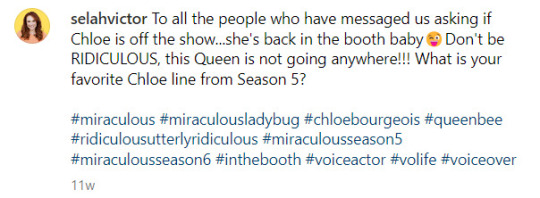
.....
youtube
#22: Adoration
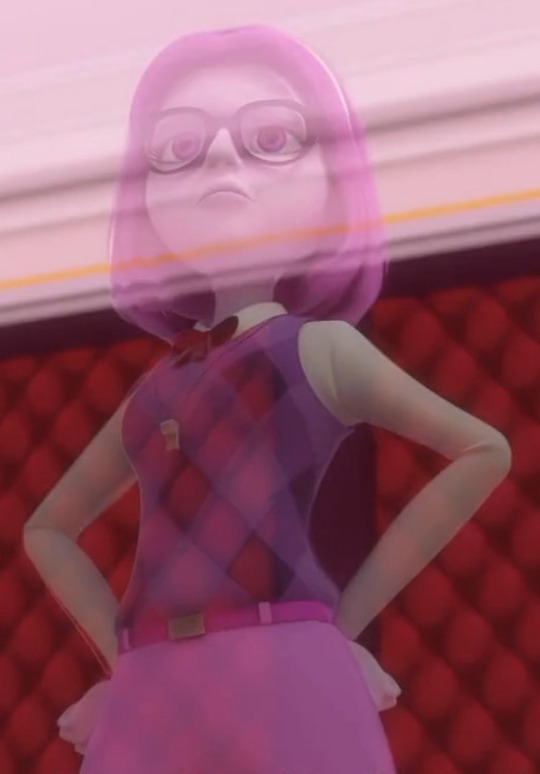
This is one of those episodes I honestly didn't think would hate as much as I did.
I think of all the episodes this season, this is the one that shows how frustratingly inconsistent the characterization is. Characters will either announce how much someone has changed or will take a complete 180 while the show makes it clear this is how things have always been. Not only does the show say Zoe has somehow changed and suddenly developed feelings for Marinette, but Chloe's view of Sabrina has gotten even lower, to the point where she calls her an underling to her face. Because actually showing character development and changing interpersonal relationships is too hard for these writers. It's like that rule everyone knows: Tell, don't show. That's how it goes, right?
Before anyone gets on my case about this, I'm not trying to say that Zoe having a crush on Marinette was a bad idea. The issue is more how it comes across like the show is trying to earn brownie points with LGBT+ audiences with the reveal. The issue is that this major revelation isn't about Zoe, but rather, Marinette. It's from a Marinette-focused episode all about her heterosexual feelings for Adrien while Zoe's coming out story is nothing more than a cautionary tale to get Marinette to finally try kissing Adrien. I'm not saying Marinette should have dumped Adrien to be with Zoe. The point I'm trying to make is if you want to show something as huge as a character coming out as sapphic, maybe put more focus on that character's struggles than the struggles the straight main character goes through. Maybe instead of being an afterthought in the story, make the episode about Marinette helping Zoe confess her feelings to a girl she likes.
This was also the episode that laid the groundwork for Andre and Sabrina's “redemption arcs”. Normally, I wouldn't mind something like them changing, but it's less to show a character becoming a better person and more to vilify a different character. Andre went from a corrupt politician who abuses his power to please his daughter to an honest politician who is forced to abuse his power to please his daughter. Sabrina went from Chloe's loyal friend who chooses to help her make people miserable to Chloe's underling who is being forced to help make people miserable. Both of them were perfectly willing to go along with Chloe's acts in the past, and as we saw in “Revolution”, being a pawn didn't excuse her from being punished, so by that logic, they shouldn't get a free pass either. It's also strange how this wasn't the episode where Andre and Sabrina officially cut ties with Chloe, considering they already had issues with them. There wasn't really a reason to wait if they already made their issues clear, especially Sabrina. Somehow framing Marinette here is okay but doing it a few episodes later is too much for her?
Also, Lila served no purpose in the episode. Just like in “Collusion” and “Revolution”, all she does is tell Chloe to do things she was perfectly capable of doing in earlier episodes. We're supposed to see her as a mastermind, but I don't get why she has to hold Chloe's hand here. Why can't Lila come up with her own plan or manipulate different people from behind the scenes? It only further highlights the double standards because while Sabrina being a lackey to Chloe earns her sympathy, Chloe being a lackey to Lila doesn't for some reason.
I am getting really tired of the whole “Nobody believes Marinette” formula that every Lila episode relies on (Chameleon, Ladybug, Risk, Revelation, Confrontation). It's the exact same story. Everyone who has known Marinette for the past four seasons suddenly loses all trust in her, only instead of instantly believing Lila, it's Chloe. CHLOE. This is worse than Lila, because she's at least in good graces with other people, but this is the same season that solidified the idea of nobody liking her at all. They seriously take her words at face value over Marinette, someone whose friends know has tormented her for a year at least (Derision)? Put aside how I feel about Chloe, this is a story that depends on trusting someone nobody has any reason to trust, and it makes no sense.
There are just so many minor issues in this episode that pile up enough to really piss me off. It's like a death by a thousand cuts.
#23: Collusion

I normally don't try to get political on this blog unless I absolutely have to, and talking about this episode is one of those occasions.
If you've been around since the early days of this blog, you'll remember that Astruc once compared Chloe to Donald Trump, and not too long after the January 6th attack on the Capitol Building at that.
Even before that thread, Astruc made a joke comparing Trump to Chloe less than a week after the attack.
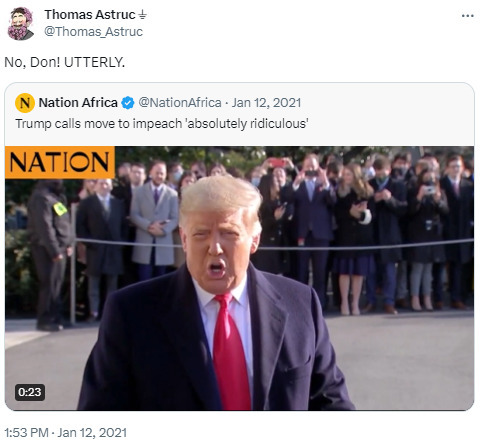
Whether you agree with Astruc's views on Trump or not, the point is that he kept up with American politics and strongly opposes him. So anyway, let's get to the episode where the heroes let someone lead a small army to storm the mayor's office and force him to resign, which is totally different from what Trump did.
I cannot get over just how confusing this episode is. For a show created by someone who usually keeps up with American politics, this is such a tone-deaf episode. I get that the story is trying to lean into French history, and I'm not sure how far into production the crew was when the attack on the Capitol happened, but given how Astruc was aware of the drama, he and his team should have at least considered the implications this episode could raise. The problem with the discussion around January 6th is that the supporters see it in as righteous a light as Miss Sans-Culotte is. As far as they know, what happened wasn't a violent invasion of government property, but a peaceful demonstration. Sure, none of the talking balloons said “Hang Andre Bourgeois!”, but it still brings similar imagery to mind.
Something that also harms the French Revolution narrative is the fact that all of Miss Sans-Culotte's supporters are helping her against her will. Much like countless Akumas throughout the show's history (Darkblade, Kung Food, The Puppeteer, Princess Fragrance, Despair Bear, Befana, Zombizou, Malediktator, Gamer 2.0, Mr. Pigeon 72, Hack-San, Revelation, Confrontation), Miss Sans-Culotte brainwashes innocent civilians so they can help her cause. This goes against the idea that she's speaking for the people, because her victims don't have a say in this. She's not reenacting the French Revolution, she's reenacting Order 66!
Also, this is something I've neglected to discuss. Why make Miss Bustier pregnant at all, much less akumatize her while pregnant? Outside of her students telling Chloe not to make a scene because the stress caused from dealing that is bad for the baby, Ms. Bustier's pregnancy adds nothing to the story. Seriously, the story thinks Chloe annoying the class is more dangerous for Ms. Bustier's baby than Ms. Bustier herself running around and getting into fights with her baby inside. It could have made for some interesting drama where Ladybug and Cat Noir are hesitant to hurt a pregnant woman, even if she's been akumatized. While the writers do try to work around it by giving her minions to do the fighting (as much as it mucks up the themes of this episode), it still doesn't explain why she needed to be pregnant during this episode in the first place.
Putting aside how unlikable Miss Sans-Culotte is in this episode, you can't even enjoy seeing Andre getting kicked out of office because this is the same episode where the writers really want us to feel bad for him. Look at how sad the rich white politician is. Let's ignore the fact that he's a big part of the reason why Chloe is as bad as she is, has abused his power multiple times, and is all around the cause of his own problems. But even though this is a show that tries to take an anti-capitalist stance (which I'll get to more in “Emotion”), we're supposed to side with one of the biggest symbols of everything wrong with capitalism and political corruption. Even then, Andre is framed for corruption instead of the several instances he actually abused his power, as if they're trying to say he was never a corrupt man. He just loves his daughter. Is that too much to ask for? His daughter herself? Eh, who cares? You really need to support the rich white man. Are we sure this show was created by a liberal?
But the biggest issue is the moral. It's impossible to frame Miss Sans-Culotte storming the mayor's office as a peaceful protest because she's clearly inspired by one of the bloodiest and most violent revolutions in history. If she was supposed to be a violent warrior who needed to learn there was a better way, that would work, but instead, the show downplays how dangerous she is... when she has a guillotine blade for a weapon. You can't claim Miss Sans-Culotte is non-violently protesting Andre's administration when she brainwashes innocent civilians, storms into the building, and demands he resign without any question. Even taking all that into consideration, the moral ends up backfiring because forcing Andre out of office caused an even bigger problem with Chloe taking over, and the very next episode threw the non-violence message out the window.
Whether or not you want to consider the political implications here, this is still a terrible episode with a terrible moral.
#24: Pretension

I've always had issues with Felix, and after the trainwreck that was “Emotion”, let's just say this didn't exactly do anything to raise my opinion of him. Just like his other appearances for the last few seasons, he did absolutely nothing to help Ladybug, focused on only doing things that benefited him, and making everyone's lives worse due to his incompetence. And somehow, this idiot is the one who moves the plot along the most.
The entire conflict happened because Felix kidnapped Kagami without even coming up with a plan. Even when he believes that Kagami is a Sentimonster (I apologize for saying that word Felix hates, but once again, the show provides no alternative to it), he doesn't think of Tomoe being able to track her or command her to leave even at a far distance. He doesn't even try to explain himself to Ladybug and Cat Noir and spends more time running away from everyone who wants to kick his ass. But by the show's logic, he just needs friends, even though his entire deal is that he works alone to get what he wants.
It's bad enough that Felix has to screw up everything he touches, but now he's dragging Kagami to his level. Kagami has cemented her role as Felix's lackey/girlfriend and nothing more. People give Marinette crap for the way the behaves around Adrien in and out of universe, but Kagami knows nothing about Felix, yet a single conversation about his past is enough for her to fall head over heels in love with him. She went from someone not willing to take any bullcrap from Marinette and Adrien to believing Felix's story in a fraction of a heartbeat. This season really likes ruining the few likable characters the show has left.
I also have to roll my eyes at the conversation Marinette and Gabriel have about fashion. For one thing, it's one of the few times the entire season remembers that Marinette wants to be a fashion designer and doesn't really factor into her rivalry with Gabriel. This season made their conflict revolve around how to treat Adrien, not their views on fashion. It feels like they only brought it up to remind viewers that Marinette is still into fashion. Well, that, and also to take a stance on artistic integrity... supposedly.
And on that note, it's amazing how the writers display little to no self-awareness during this scene. The show that embraces sticking to the status quo and rejecting almost any attempt at keeping consistent continuity is now trying to teach children about the importance of being willing to take risks when creating something. This is like Hannibal Lecter trying to promote veganism. I get the message, but the messenger's history is keeping me from buying it. It doesn't help that for a scene trying to point out how outdated certain views are, the show ultimately chooses to take the side of the man with the “wrong” mindset by the end of the season.
The pancake metaphor really confuses me too. It's meant to be a running gag that the only thing Gabriel knows how to cook is pancakes, but A) Nothing is really indicated to show how terrible they are as a metaphor for how bad his outdated views are other than Marinette's verbal assessment of them, and B) We later learn Gabriel used to be poor, so either he never knew how to cook prior to earning his fortune or being rich somehow made him forget basic living skills. I'm just saying, when an episode of Sid the Science Kid manages to better convey someone doing a terrible job making pancakes, you might need to put in a little more effort to show how bad Gabriel's pancakes supposedly are.
Finally, Tomoe. This episode didn't really do much to show her as a compelling threat, given all she did was nag Gabriel and try to shoot her daughter when she didn't even try commanding her to fight back when she was kidnapped. She's nothing more than a female Gabriel and is another example of how overstuffed this show's cast is,
This episode is awful, plain and simple. It took aspects from previous episodes that were already questionable, and doubled down on them while acting like there weren't any problems at all.
#25: Derision

And now we're onto the really, REALLY bad episodes this season. One of the reasons why this post took so long to make was that I wasn't sure how to rank these last three episodes. Thankfully, I managed to find a way to rank them based on the morals are executed. With that being said, let's start scraping the bottom of the barrel.
Ah, “Derision”. You're the only episode that makes the backlash caused by “Chameleon” seem like a pleasant breeze. It's incredible to see just how much negative a reputation this episode has in the fandom. Virtually nobody likes it because it manages to upset everyone with its poor characterization. I'm talking Marinette fans, Adrien fans, Chloe fans, Kim fans, and pretty much every other character's fans. I've only seen a few die hard fans defend this episode, and they're the people on Tumblr who defend pretty much everything done this season.
I have just one question to ask about this episode: Why did it need to happen? We didn't learn anything new that we didn't know already. We know Chloe is mean, and we know Marinette used to be more timid and had no friends. We didn't even need that much of an explanation for why Marinette acts the way she does around Adrien, seeing how it was usually played for laughs
Speaking of which, let's talk about the fact that the episode tries to shame the audience for laughing at the jokes about Marinette's reactions to Adrien. You know, something that was the show's primary running gag ever since Season 1? A running gag the writers ran into the ground by the end of Season 3 but still chose to go with it? Now we're not supposed to have laughed at it, assuming we laughed at it all. Way to insult even the small portion of viewers who didn't get on your case about this, writers.
I only have about two positive things to say about this episode. For one thing, Chloe actually served as a pretty decent antagonist in the flashbacks. Much like in “Revolution”, when the writers actually let her be a villain on her own without being made a pawn, she can be somewhat entertaining. If this was the Chloe we got after Season 3, I don't I would have been as upset at the direction Astruc's team took with the character.
In addition, the thing that saves this episode from being at the bottom is that unlike the next two, it actually understands that what the antagonist did was wrong. They don't make up excuses for what Chloe did and she actually gets called out as a result. It doesn't lead to anything major, but it's something.
Like with “Queen Banana”, there's not much else I can say that hasn't already been said. There's plenty of retcons, the characterization for everyone is off, it attacks the audience, and the message about trauma got fumbled by the show's usual double standards. It's been said over and over again, and it's become a symbol of how much the show's quality has degraded.
#26: Emotion

I think if you've kept up with my reviews of this season, you should know by now that I don't exactly like Felix, and most of the problems I have with him can be attributed to this episode. In fact, for a while, this was going to be my choice for the bottom slot.
It's clear that the writers want to make Felix this wild card who's only in it for himself, but like most of the show's antagonists, they want to show Felix as this devious mastermind... but he's also not really evil, and you should feel bad for him. For most of the episode, Felix does nothing but make everyone's lives worse during his first outing as Argos. He smears his cousin's reputation yet again, tricks his girlfriend into dancing with him, condemns some rich kids for the crime of being rich when he's just as rich, and eventually wipes out all life on the face of the earth. But he's just doing it for his cousin, we swear!
While Felix has understandable motivations for what he does, wanting to free Adrien and Kagami, the way he tries to achieve his goal makes it hard to sympathize with him. If the whole point was that what he did was wrong and that he needs to find a different way, that could work. Instead, we're supposed to see him as this tragic figure who was forced to do terrible things when the episode shows him happily singing while causing chaos. It's the same problem with Gabriel, wanting a sympathetic character to do unapologetically evil things. The fact that he has to be told that genocide is bad doesn't make us want to sympathize with him when he breaks down crying. It paints a picture that he's crazy but the show wants to act like he isn't.
Even putting all the crap with Felix aside, the episode is still unbearable. The stuff with Marinette was poorly executed and was just done to get her involved in the plot, and later become the first one to excuse Felix for betraying her. Other than the dance scene, you could easily just have Marinette swing in as Ladybug when Argos starts his rampage and nothing would really change. The episode tries to make jokes about how unnecessary this is, but as usual, its attempts to be self-aware come across like its saying “What we're doing it wrong, we know it's wrong, but we're gonna do it anyway!”
Speaking of the dance scene, I can't stop rolling my eyes whenever Felix tries to be all “We live in a society” to Marinette. Forget the corrupt politicians, corporate moguls, human traffickers, and despotic rulers of foreign nations. The absolute worst section of humanity is composed of the teenage children of the 1%. Sure, you'd have to break my legs before I'd agree to supervise them at this party, but I don't get why these are the people we're supposed to see as irredeemable monsters. Do the writers think because these kids associate themselves with Chloe, we'll automatically hate them? Newsflash, but if I had to choose between hanging out with some annoying kids and a mass murderer, I'd stick with the annoying kids.
Rewatching this episode was what helped me finally realize just what my problem with the show's anti-capitalist message is. How the hell am I supposed to hate the villains on this show for being rich when several characters are rich or at the very least, are successful thanks to their connections to the rich? Think about it for a second. Putting aside Adrien and Kagami, you have Marinette, the daughter of two of the most popular bakers in Paris and earned the respect of multiple celebrities, Alya, the daughter of a chef who works at a five-star hotel, Nino, someone who got to DJ at a major fashion show, Rose, who is friends with a literal prince, Luka and Juleka, the children of a popular rock star, and Max, the son of an astronaut with access to cutting-edge technology. Somehow, these people are supposed to be poor? They make Monica from Friends look like Oscar the Grouch. It's why I can't take the message seriously. You can't write a story about a class struggle when both classes are shown to be pretty well-off.
The only thing that saves this episode from being at the bottom of the list is the fact that despite committing genocide while singing, Felix at least gets what he did was wrong and makes up for it. It doesn't fix everything else he did in this episode, but that's better than nothing. As for the villain featured in the episode that's at the bottom of this list? If you've been keeping track, I think you know who I mean.
#27: Re-Creation

I'll admit, I'm sort of cheating here. I'm judging this episode more as a finale than an individual episode, but I'm making an exception because the plot is tied to wrapping up all the loose ends this season.
I'm mentioning this because for a season finale, the stakes just feel so low. The fight between Bug Noire and Monarch doesn't have any weight to it because they've barely interacted at all for the last five seasons. These are supposed to be two mortal enemies, but you can't really buy the enmity between them. It ultimately cheapens the moment of Bug Noire triumphing over Monarch in the end... before Monarch triumphs over her not long afterwards, but we'll get to that.
The stuff with the Miraculized doesn't help either. We already know that the Ladybug and Cat Miraculous are in the Agreste manor, so the Miraculized's goal is impossible to achieve. It's never even explained why the Miraculized don't go back to the manor to help Monarch beat Bug Noire, since they should still be able to track the Miraculous. All of the fights with them just come across like filler, and there's no real sense of danger or hopelessness to be found. Whether the Miraculized win or lose is irrelevant. Nothing will happen either way because the important stuff is happening in the Agreste manor.
This extends to the part where all the heroes appear to help. It doesn't come across as an Avengers-esque moment for the climax, because it doesn't change anything. The episode never explains what any of these characters were doing prior to the events of this episode and why only now they're helping out. The United Heroes are the most egregious example because unlike Fei or Su-Han, they're a major organization whose members include the president, and they didn't do a damn thing when Monarch stole all of the other Miraculous. Speaking of, there is no way in hell that Su-Han taught Mirakung-Fu to three random people over Ladybug and Cat Noir, much less that those three people are actual masters after about two months at best. Maybe they got to train in Bunnix's Burrow? After all, she's not doing anything else to stop the end of the world other than sending four people over to Paris. This whole sequence really highlights how bland the other heroes of this universe are. If they're not slacking off when they're needed, they're criminally underdeveloped because there's a slim chance they'll get spin-offs to flesh them out.
But I think the biggest issue me and other people have with this finale is the resolution. In what is easily one of the most baffling decisions the show has made, Bug Noire doesn't defeat Monarch, and Monarch gets to make his wish. I don't care how many times the writers technically say she won because she beat him in a fight. Gabriel backstabbed her at the last minute and got her Miraculous to make his wish. Yeah, he died, but he succeed in achieving his goal, never faced any real consequences, didn't get any closure with his son (much less apologize for abusing him), told Marinette to lie about the monster he was to him, and was turned into a martyr with a statue made of the same things he used to control the world.
This ending infuriates me because it not only makes Marinette out to be a terrible hero for failing to do the one thing she was chosen to do (get the Butterfly Miraculous back), but it also ultimately makes Gabriel out to be a decent person even though he destroyed and recreated the world. All Marinette did was take credit for saving the world, and even then, Gabriel got more celebration in the end. Our hero, ladies and gentlemen! She got outsmarted by an abusive parent and didn't even get a new statue in her honor!
But the most damning thing of all this is the fact that this finale retroactively makes everything that's happened over the last five seasons completely pointless. If Gabriel making a wish wasn't as bad as it was supposed to be, why didn't Ladybug and Cat Noir let him borrow their Miraculous? Why make the stakes this high if you're going to downplay the impact of a madman recreating the world in his own image? Follow-up question: why make the stakes this high if the wish being made is ultimately shown to have huge benefits for society? In an attempt to wrap things up with a happy ending, the writers accidentally made the conflict completely meaningless.
That's why this resolution is the ultimate example of the writers refusing to allow any major changes to happen. If they're willing to treat the end of the universe as less important than Ms. Bustier becoming mayor, why should we assume they'll ever take their story seriously? For God's sake, every character you know and love is essentially dead, and we're supposed to act like that isn't a big deal? That's how you wanted to end the show originally? Then again, at least they tried to resolve something, unlike the Love Square. We still haven't gotten a reveal, and I don't think we ever will at this point. These writers will drag out the story until the show stops becoming profitable, which won't be for a long time.
And with that, I am officially done with Season 5. Honestly, after having to rewatch this season again, I'm not sure if it's even worth giving Season 6 a shot. There's nothing to look forward to, and Lila becoming the main villain isn't really appealing to me. At the very least, I have the movie review to look forward to, meaning I can watch something good for a change.
67 notes
·
View notes
Text
8 Signs your Sequel Needs Work
Sequels, and followup seasons to TV shows, can be very tricky to get right. Most of the time, especially with the onslaught of sequels, remakes, and remake-quels over the past… 15 years? There’s a few stand-outs for sure. I hear Dune Part 2 stuck the landing. Everyone who likes John Wick also likes those sequels. Spiderverse 2 also stuck the landing.
These are less tips and more fundamental pieces of your story that may or may not factor in because every work is different, and this is coming from an audience’s perspective. Maybe some of these will be the flaws you just couldn’t put your finger on before. And, of course, these are all my opinions, for sequels and later seasons that just didn’t work for me.
1. Your vague lore becomes a gimmick
The Force, this mysterious entity that needs no further explanation… is now quantifiable with midichlorians.
In The 100, the little chip that contains the “reincarnation” of the Commanders is now the central plot to their season 6 “invasion of the bodysnatchers” villains.
In The Vampire Diaries, the existence of the “emotion switch” is explicitly disputed as even existing in the earlier seasons, then becomes a very real and physical plot point one can toggle on and off.
I love hard magic systems. I love soft magic systems, too. These two are not evolutions of each other and doing so will ruin your magic system. People fell in love with the hard magic because they liked the rules, the rules made sense, and everything you wrote fit within those rules. Don’t get wacky and suddenly start inventing new rules that break your old ones.
People fell in love with the soft magic because it needed no rules, the magic made sense without overtaking the story or creating plot holes for why it didn’t just save the day. Don’t give your audience everything they never needed to know and impose limitations that didn’t need to be there.
Solving the mystery will never be as satisfying as whatever the reader came up with in their mind. Satisfaction is the death of desire.
2. The established theme becomes un-established
I talked about this point already in this post about theme so the abridged version here: If your story has major themes you’ve set out to explore, like “the dichotomy of good and evil” and you abandon that theme either for a contradictory one, or no theme at all, your sequel will feel less polished and meaningful than its predecessor, because the new story doesn’t have as much (if anything) to say, while the original did.
Jurassic Park is a fantastic, stellar example. First movie is about the folly of human arrogance and the inherent disaster and hubris in thinking one can control forces of nature for superficial gains. The sequels, and then sequel series, never returns to this theme (and also stops remembering that dinosaurs are animals, not generic movie monsters). JP wasn’t just scary because ahhh big scary reptiles. JP was scary because the story is an easily preventable tragedy, and yes the dinosaurs are eating people, but the people only have other people to blame. Dinosaurs are just hungry, frightened animals.
Or, the most obvious example in Pixar’s history: Cars to Cars 2.
3. You focus on the wrong elements based on ‘fan feedback’
We love fans. Fans make us money. Fans do not know what they want out of a sequel. Fans will never know what they want out of a sequel, nor will studios know how to interpret those wants. Ask Star Wars. Heck, ask the last 8 books out of the Percy Jackson universe.
Going back to Cars 2 (and why I loathe the concept of comedic relief characters, truly), Disney saw dollar signs with how popular Mater was, so, logically, they gave fans more Mater. They gave us more car gimmicks, they expanded the lore that no one asked for. They did try to give us new pretty racing venues and new cool characters. The writers really did try, but some random Suit decided a car spy thriller was better and this is what we got.
The elements your sequel focuses on could be points 1 or 2, based on reception. If your audience universally hates a character for legitimate reasons, maybe listen, but if your audience is at war with itself over superficial BS like whether or not she’s a female character, or POC, ignore them and write the character you set out to write. Maybe their arc wasn’t finished yet, and they had a really cool story that never got told.
This could be side-characters, or a specific location/pocket of worldbuilding that really resonated, a romantic subplot, whatever. Point is, careening off your plan without considering the consequences doesn’t usually end well.
4. You don’t focus on the ‘right’ elements
I don’t think anyone out there will happily sit down and enjoy the entirety of Thor: The Dark World. The only reasons I would watch that movie now are because a couple of the jokes are funny, and the whole bit in the middle with Thor and Loki. Why wasn’t this the whole movie? No one cares about the lore, but people really loved Loki, especially when there wasn’t much about him in the MCU at the time, and taking a villain fresh off his big hit with the first Avengers and throwing him in a reluctant “enemy of my enemy” plot for this entire movie would have been amazing.
Loki also refuses to stay dead because he’s too popular, thus we get a cyclical and frustrating arc where he only has development when the producers demand so they can make maximum profit off his character, but back then, in phase 2 world, the mystery around Loki was what made him so compelling and the drama around those two on screen was really good! They bounced so well off each other, they both had very different strengths and perspectives, both had real grievances to air, and in that movie, they *both* lost their mother. It’s not even that it’s a bad sequel, it’s just a plain bad movie.
The movie exists to keep establishing the Infinity Stones with the red one and I can’t remember what the red one does at this point, but it could have so easily done both. The powers that be should have known their strongest elements were Thor and Loki and their relationship, and run with it.
This isn’t “give into the demands of fans who want more Loki” it’s being smart enough to look at your own work and suss out what you think the most intriguing elements are and which have the most room and potential to grow (and also test audiences and beta readers to tell you the ugly truth). Sequels should feel more like natural continuations of the original story, not shameless cash grabs.
5. You walk back character development for ~drama~
As in, characters who got together at the end of book 1 suddenly start fighting because the “will they/won’t they” was the juiciest dynamic of their relationship and you don’t know how to write a compelling, happy couple. Or a character who overcame their snobbery, cowardice, grizzled nature, or phobia suddenly has it again because, again, that was the most compelling part of their character and you don’t know who they are without it.
To be honest, yeah, the buildup of a relationship does tend to be more entertaining in media, but that’s also because solid, respectful, healthy relationships in media are a rarity. Season 1 of Outlander remains the best, in part because of the rapid growth of the main love interest’s relationship. Every season after, they’re already married, already together, and occasionally dealing with baby shenanigans, and it’s them against the world and, yeah, I got bored.
There’s just so much you can do with a freshly established relationship: Those two are a *team* now. The drama and intrigue no longer comes from them against each other, it’s them together against a new antagonist and their different approaches to solving a problem. They can and should still have distinct personalities and perspectives on whatever story you throw them into.
6. It’s the same exact story, just Bigger
I have been sitting on a “how to scale power” post for months now because I’m still not sure on reception but here’s a little bit on what I mean.
Original: Oh no, the big bad guy wants to destroy New York
Sequel: Oh no, the big bad guy wants to destroy the planet
Threequel: Oh no, the big bad guy wants to destroy the galaxy
You knew it wasn’t going to happen the first time, you absolutely know it won’t happen on a bigger scale. Usually, when this happens, plot holes abound. You end up deleting or forgetting about characters’ convenient powers and abilities, deleting or forgetting about established relationships and new ground gained with side characters and entities, and deleting or forgetting about stakes, themes, and actually growing your characters like this isn’t the exact same story, just Bigger.
How many Bond movies are there? Thirty-something? I know some are very, very good and some are not at all good. They’re all Bond movies. People keep watching them because they’re formulaic, but there’s also been seven Bond actors and the movies aren’t one long, continuous, self-referential story about this poor, poor man who has the worst luck in the universe. These sequels aren’t “this but bigger” it’s usually “this, but different”, which is almost always better.
“This, but different now” will demand a different skillset from your hero, different rules to play by, different expectations, and different stakes. It does not just demand your hero learn to punch harder.
Example: Lord Shen from Kung Fu Panda 2 does have more influence than Tai Lung, yes. He’s got a whole city and his backstory is further-reaching, but he’s objectively worse in close combat—so he doesn’t fistfight Po. He has cannons, very dangerous cannons, cannons designed to be so strong that kung fu doesn’t matter. Thus, he’s not necessarily “bigger” he’s just “different” and his whole story demands new perspective.
The differences between Empire Strikes Back and Return of the Jedi are numerous, but the latter relies on “but bigger” and the former went in a whole new direction, while still staying faithful to the themes of the original.
7. It undermines the original by awakening a new problem too soon
I’ve already complained about the mere existence of Heroes of Olympus elsewhere because everything Luke fought and died for only bought that world about a month of peace before the gods came and ripped it all away for More Story.
I’ve also complained that the Star Wars Sequels were always going to spit in the face of a character’s six-movie legacy to bring balance to the Force by just going… nah. Ancient prophecy? Only bought us about 30 years of peace.
Whether it’s too soon, or it’s too closely related to the original, your audience is going to feel a little put-off when they realize how inconsequential this sequel makes the original, particularly in TV shows that run too many seasons and can’t keep upping the ante, like Supernatural.
Kung Fu Panda once again because these two movies are amazing. Shen is completely unrelated to Tai Lung. He’s not threatening the Valley of Peace or Shifu or Oogway or anything the heroes fought for in the original. He’s brand new.
My yearning to see these two on screen together to just watch them verbally spat over both being bratty children disappointed by their parents is unquantifiable. This movie is a damn near perfect sequel. Somebody write me fanfic with these two throwing hands over their drastically different perspectives on kung fu.
8. It’s so divorced from the original that it can barely even be called a sequel
Otherwise known as seasons 5 and 6 of Lost. Otherwise known as: This show was on a sci-fi trajectory and something catastrophic happened to cause a dramatic hairpin turn off that path and into pseudo-biblical territory. Why did it all end in a church? I’m not joking, they did actually abandon The Plan while in a mach 1 nosedive.
I also have a post I’ve been sitting on about how to handle faith in fiction, so I’ll say this: The premise of Lost was the trials and escapades of a group of 48 strangers trying to survive and find rescue off a mysterious island with some creepy, sciency shenanigans going on once they discover that the island isn’t actually uninhabited.
Season 6 is about finding “candidates” to replace the island’s Discount Jesus who serves as the ambassador-protector of the island, who is also immortal until he’s not, and the island becomes a kind of purgatory where they all actually did die in the crash and were just waiting to… die again and go to heaven. Spoiler Alert.
This is also otherwise known as: Oh sh*t, Warner Bros wants more Supernatural? But we wrapped it up so nicely with Sam and Adam in the box with Lucifer. I tried to watch one of those YouTube compilations of Cas’ funny moments because I haven’t seen every episode, and the misery on these actors’ faces as the compilation advanced through the seasons, all the joy and wit sucked from their performances, was just tragic.
I get it. Writers can’t control when the Powers That Be demand More Story so they can run their workhorse into the ground until it stops bleeding money, but if you aren’t controlled by said powers, either take it all back to basics, like Cars 3, or just stop.
—
Sometimes taking your established characters and throwing them into a completely unrecognizable story works, but those unrecongizable stories work that much harder to at least keep the characters' development and progression satisfying and familiar. See this post about timeskips that take generational gaps between the original and the sequel, and still deliver on a satisfying continuation.
TLDR: Sequels are hard and it’s never just one detail that makes them difficult to pull off. They will always be compared to their predecessors, always with the expectations to be as good as or surpass the original, when the original had no such competition. There’s also audience expectations for how they think the story, lore, and relationships should progress. Most faults of sequels, in my opinion, lie in straying too far from the fundamentals of the original without understanding why those fundamentals were so important to the original’s success.
#writing advice#writing resources#writing tips#writing tools#writing a book#writing#writeblr#sequels#kung fu panda
121 notes
·
View notes
Text
I need to talk about Morgan Elsbeth and the connection to Thrawn. Along with some other questionable narrative choices Filoni has made with Thrawn.
I want to preface, this is not going to be a hating Morgan Elsbeth post nor hating on the actress or any bts production of her character. There is enough hate towards characters like this in this fandom and I will not be perpetuating that (take that negativity somewhere else). I only want this to be an open discussion on this part of Thrawn's story.
Morgan is a character that has been placed into Thrawn's canon timeline. She was not written in (everything is written obvs but let me explain). The distinction I want to make between those narrative ideas is, placing a character into a story means they are important in supporting the main character, but no one cares if they are replaced or removed from the story. Writing a character into the story means they are so important to the direct development of the mc, if they are replaced or removed it feels like a piece of that character is missing. Some examples for Thrawn would be Eli Vanto or Ar'alani. Morgan was removed from the story in the Ahsoka series and it didn't even effect Thrawn himself.
So why create this character and push a narrative that makes her seem like the most important part of the story? Like without her Thrawn wouldn't be able to get back to the galaxy? Thrawn is a genius, a warrior, and a survivor. He could've figure that out himself, or with the help of Ezra (an established character that the audience loves). Instead he's had to rely on Morgan.
This is where my qualm with Dave Filoni comes into play. I love Filoni's work he has created some of my favorite stories in the Star Wars franchise. But he does one thing that I despise. Ignores the work of amazing authors. In this case Timothy Zahn. I can't say for sure that he hasn't read the Ascendancy Trilogy or the Thrawn (2017) trilogy, but it feels like it when analyzing Filoni's characterization of Thrawn. If he did read those books or least consulted Zahn on them he would know Thrawn's true motives for what he does. He is a protector for the greater good. He goes against many higher powers to make the right choice, not the good or bad choices. He shows the characters around him time and time again that he will always do what is right even if it means his downfall. He is not a villain in his own story just himself, not good or bad, the one in the middle. He evolves, learns, observes, and understands things on a completely different level. And we only see a sliver of this characterization in Filoni's story. I understand the narrative built around Thrawn being the ultimate villain for the ghost crew because a good story like this should have an interesting dynamic between protagonist and antagonist. But the fact that you'd have to read his books to know who he is, is a clear indication to me that his novel characterization wasn't researched enough.
It also shows me that Filoni favors the legends version of Thrawn more. Especially with the inclusion of Pellaeon in Tales of the Empire and not Eli Vanto. Who could have easily been placed into that role. Although, he his Thrawn's aide he can and has done things like that for Thrawn.
Now in Tales of the Empire we see that he isn't the original creator of the TIE Defender. Trying to place Morgan into a characters story that is so beloved [Thrawn] feels so forced through this idea that she created the TIE Defender. Why would someone who is trying to get revenge for her people go to the Empire with an idea like this. If she is so angry why she is relying on someone else's power to get her revenge? And even when she got in the good graces of the Empire with Thrawn what came of it? The Defender project was ruined, shouldn't her allegiance to Thrawn be in ruin too. The deal they made implied she would get what she wanted, but she never did and was still loyal to him. Thrawn does have this quality about him though, you'd follow him off a cliff, the gravity in which he attracts people to his cause is so alluring. But that still doesn't explain where Morgans revenge story went. And in the end she really does feel like a character that can be replaced.
Trying to make a character that was placed into the story important to the audience does a disservice to the story as a whole. Thrawn has an established world of characters in the novels that are readily available to use in the narrative. So why aren't they in it? Eli especially in one I cannot ignore the absence of. From the moment Thrawn is found in exile Eli does not leave his side. Eli follows him into battle again and again. Even after realzing his initial career choice will amount to nothing now that Thrawn has taken over his duty in the Imperial Navy. Thrawn himself says "you hold my words in your hand, and their meanings," and although that was in relation to his survival with the Empire it still held true throughout the story. Eli is an extension of Thrawn, whatever is said to Eli is said to Thrawn and vise versa. So where is he?
(Ok that's all my ramblings for now. Hopefully this made sense. Feel free to leave your thoughts in the tags or replies. Thrawn was the first sw novel I read, I'm fiercely protective of him. So when his characterization is kinda ruined like this it upsets me. But I'm always excited to see him in any media and hear that silky voice of his, thank you lars.)
#thrawn#thrawn 2017#eli vanto#star wars#sw novels#morgan elsbeth#ahsoka series#tales of the empire#tote spoilers#sw spoilers#long post#nobie does stuff
76 notes
·
View notes